25.2.2026
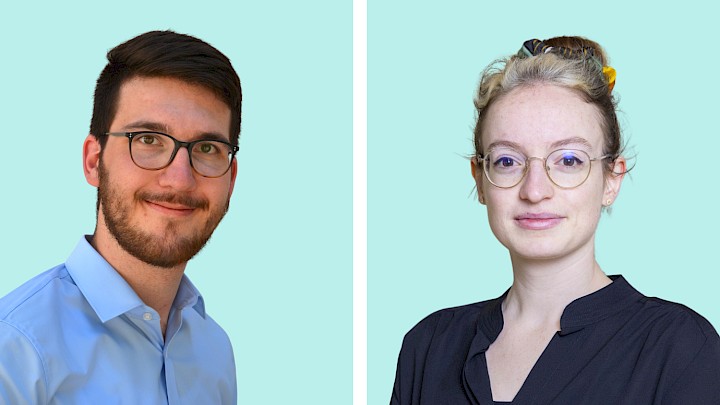
Two Labs, One Team: A Chemoenzymatic Story
Team portrait, from left to right: Nicolas Imstepf, Adriana Neves Vieira.
At the end of 2025, two researchers from ZHAW and ETH Zürich participated in a lab exchange, where they each spent time in the other's lab, working together on their joint project through the NCCR Catalysis Catalyzer Program. Meet Adriana Neves Vieira, a recipient of the 2025 Talent Program in Catalysis and Sustainable Chemistry, and Nicolas Impstef, a recipient of the 2022 NCCR Catalysis Young Talents Fellowship, as they describe their experience!
Hi Adriana and Nicolas, could you tell us about yourselves and your research within NCCR Catalysis?
Adriana: I come from Portugal and grew up in Neuchâtel. I then moved to Lausanne, where I completed my Bachelor’s and Master’s degrees in Molecular and Biological Chemistry at EPFL. I continued my training by joining the Morandi group as a PhD student to develop new catalytic methods for organic synthesis. I have been collaborating with Nicolas and Prof. Buller to develop a cooperative chemoenzymatic system. In parallel, I also focus my research on developing new uses for phosphonium salts.
Nicolas: I grew up in a small village in the canton of Valais and started my career with an apprenticeship as a chemical laboratory technician at Lonza. I subsequently earned a Bachelor’s degree in Chemistry and a Master’s degree in Computational Life Sciences from the ZHAW. Since 2023, I have been a PhD student in the Buller group, where I focus on engineering enzymes for next-generation industrial biocatalysis. In our collaborative chemoenzymatic project, Adriana leads the chemical aspects, while I contribute specialized expertise in biocatalysis and enzyme engineering.
How did the collaboration between the Morandi and Buller groups emerge?
Adriana & Nicolas: The collaboration began during the preparation of Phase II of the NCCR Catalysis, when Prof. Buller and Prof. Morandi jointly proposed the project's core idea. At the same time, Adriana began her PhD in the Morandi group and expressed interest in a collaborative project that aligned well with the Phase II timeline. This led to a joint brainstorming session involving all four researchers, during which the project took shape and evolved into its current form.
Adriana and Nicolas in the Morandi lab at ETHZ (left), and Adriana in the Buller lab at ZHAW (right).
You recently conducted a tandem lab exchange between ZHAW and ETH Zürich. How did the exchange benefit you as researchers and impact the project?
Adriana: It has been an amazing opportunity for me to practice interdisciplinary collaboration. This reflects what happens in industry, where I am heading, where most projects include members with very diverse backgrounds. I could develop my leadership and communication skills as well as my understanding of biochemical lab work.
Nicolas: The collaboration exposed me to a different academic culture and strengthened my critical thinking by encouraging me to approach problems from new perspectives. A decade after completing my apprenticeship, the exchange also served as a valuable refresher in organic chemistry and provided deeper insight into advanced experimental techniques.
Adriana & Nicolas: At the beginning of the collaboration, we faced natural challenges: the partner lab’s organization and workflows were unfamiliar, with different methods and corresponding problems. This lack of shared context made it difficult to contribute ideas that were both relevant and technically feasible. Without a clear understanding of how their research was conducted, even well-intentioned input risked being impractical or misaligned.
Through developing a deeper understanding of our partners’ work and maintaining open, continuous communication, we were able to anticipate challenges early, align expectations, and collaboratively develop effective solutions rather than simply merging results. Daily exchanges during these weeks enabled efficient idea sharing, faster progress, and a shared perspective on the project, ultimately strengthening both its direction and the quality of the research.
Adriana and Nicolas with NCCR Catalysis colleagues from the Buller and Benin groups at the photo booth at the NCCR Catalysis Annal Meeting 2025.
What advice would you give other early-career researchers on collaborations and exchanges between labs?
Adriana & Nicolas: Take the opportunity to visit other laboratories! You learn about a new field from passionate researchers, and you can share your own passion with someone eager to learn. In addition, you will also gain more insight into your own field, since your collaborator will ask questions about information that you took for granted.
What did you learn from hosting your colleague in your lab?
Adriana & Nicolas: It made us aware of different working styles. The colleague's arrival burst the scientific bubble we had been in, since we had quickly gotten used to our own laboratory's working habits. We got a different perspective that helped us realise what we had overlooked as good organizational features. It also made us aware of areas that could be improved, to make our PhD stay better and healthier.
What was surprising about your experience in the other lab?
Adriana: I had the misconception that enzymes are fragile at temperatures far from 37°C and in the presence of water as a solvent. I was surprised to learn that they can be used in so many different conditions and for many different substrates. I was impressed by the high-throughput methods used in biocatalysis and, as a consequence, by the amount of data that bioinformaticians need to handle.
Nicolas: One of the most surprising aspects of my experience in the Morandi lab was the versatility of the research areas and the level of independence given to researchers. PhD students were encouraged to choose and shape their own research projects, fostering a strong sense of ownership and motivation. This combination of diversity and independence made the lab environment both empowering and inspiring.
Nicolas, Adriana and Stefan in a Zoom call between the Buller, Morandi and Jorner groups.
What will be the next steps in your collaboration?
Adriana & Nicolas: To accelerate the identification of a functional system, we expanded our collaboration to include Stefan Schmid, another member of NCCR Catalysis (Jorner group), who brings expertise in computational chemistry. His work employs Bayesian optimization to guide reaction optimization and efficiently steer the system toward product formation. In parallel, we are extending the developed model system to more complex substrates such as hormones.
Thank you so much for sharing your experience! We wish you continued success in your project.
Learn more about Adriana's research here, and connect with her on LinkedIn. Learn more about Nicolas' research here, and connect with him on LinkedIn.
At the end of 2025, two researchers from ZHAW and ETH Zürich participated in a lab exchange, where they each spent time in the other's lab, working together on their joint project through the NCCR Catalysis Catalyzer Program. Meet Adriana Neves Vieira, a recipient of the 2025 Talent Program in Catalysis and Sustainable Chemistry, and Nicolas Impstef, a recipient of the 2022 NCCR Catalysis Young Talents Fellowship, as they describe their experience!
Hi Adriana and Nicolas, could you tell us about yourselves and your research within NCCR Catalysis?
Adriana: I come from Portugal and grew up in Neuchâtel. I then moved to Lausanne, where I completed my Bachelor’s and Master’s degrees in Molecular and Biological Chemistry at EPFL. I continued my training by joining the Morandi group as a PhD student to develop new catalytic methods for organic synthesis. I have been collaborating with Nicolas and Prof. Buller to develop a cooperative chemoenzymatic system. In parallel, I also focus my research on developing new uses for phosphonium salts.
Nicolas: I grew up in a small village in the canton of Valais and started my career with an apprenticeship as a chemical laboratory technician at Lonza. I subsequently earned a Bachelor’s degree in Chemistry and a Master’s degree in Computational Life Sciences from the ZHAW. Since 2023, I have been a PhD student in the Buller group, where I focus on engineering enzymes for next-generation industrial biocatalysis. In our collaborative chemoenzymatic project, Adriana leads the chemical aspects, while I contribute specialized expertise in biocatalysis and enzyme engineering.
How did the collaboration between the Morandi and Buller groups emerge?
Adriana & Nicolas: The collaboration began during the preparation of Phase II of the NCCR Catalysis, when Prof. Buller and Prof. Morandi jointly proposed the project's core idea. At the same time, Adriana began her PhD in the Morandi group and expressed interest in a collaborative project that aligned well with the Phase II timeline. This led to a joint brainstorming session involving all four researchers, during which the project took shape and evolved into its current form.
Adriana and Nicolas in the Morandi lab at ETHZ (left), and Adriana in the Buller lab at ZHAW (right).
You recently conducted a tandem lab exchange between ZHAW and ETH Zürich. How did the exchange benefit you as researchers and impact the project?
Adriana: It has been an amazing opportunity for me to practice interdisciplinary collaboration. This reflects what happens in industry, where I am heading, where most projects include members with very diverse backgrounds. I could develop my leadership and communication skills as well as my understanding of biochemical lab work.
Nicolas: The collaboration exposed me to a different academic culture and strengthened my critical thinking by encouraging me to approach problems from new perspectives. A decade after completing my apprenticeship, the exchange also served as a valuable refresher in organic chemistry and provided deeper insight into advanced experimental techniques.
Adriana & Nicolas: At the beginning of the collaboration, we faced natural challenges: the partner lab’s organization and workflows were unfamiliar, with different methods and corresponding problems. This lack of shared context made it difficult to contribute ideas that were both relevant and technically feasible. Without a clear understanding of how their research was conducted, even well-intentioned input risked being impractical or misaligned.
Through developing a deeper understanding of our partners’ work and maintaining open, continuous communication, we were able to anticipate challenges early, align expectations, and collaboratively develop effective solutions rather than simply merging results. Daily exchanges during these weeks enabled efficient idea sharing, faster progress, and a shared perspective on the project, ultimately strengthening both its direction and the quality of the research.
Adriana and Nicolas with NCCR Catalysis colleagues from the Buller and Benin groups at the photo booth at the NCCR Catalysis Annal Meeting 2025.
What advice would you give other early-career researchers on collaborations and exchanges between labs?
Adriana & Nicolas: Take the opportunity to visit other laboratories! You learn about a new field from passionate researchers, and you can share your own passion with someone eager to learn. In addition, you will also gain more insight into your own field, since your collaborator will ask questions about information that you took for granted.
What did you learn from hosting your colleague in your lab?
Adriana & Nicolas: It made us aware of different working styles. The colleague's arrival burst the scientific bubble we had been in, since we had quickly gotten used to our own laboratory's working habits. We got a different perspective that helped us realise what we had overlooked as good organizational features. It also made us aware of areas that could be improved, to make our PhD stay better and healthier.
What was surprising about your experience in the other lab?
Adriana: I had the misconception that enzymes are fragile at temperatures far from 37°C and in the presence of water as a solvent. I was surprised to learn that they can be used in so many different conditions and for many different substrates. I was impressed by the high-throughput methods used in biocatalysis and, as a consequence, by the amount of data that bioinformaticians need to handle.
Nicolas: One of the most surprising aspects of my experience in the Morandi lab was the versatility of the research areas and the level of independence given to researchers. PhD students were encouraged to choose and shape their own research projects, fostering a strong sense of ownership and motivation. This combination of diversity and independence made the lab environment both empowering and inspiring.
Nicolas, Adriana and Stefan in a Zoom call between the Buller, Morandi and Jorner groups.
What will be the next steps in your collaboration?
Adriana & Nicolas: To accelerate the identification of a functional system, we expanded our collaboration to include Stefan Schmid, another member of NCCR Catalysis (Jorner group), who brings expertise in computational chemistry. His work employs Bayesian optimization to guide reaction optimization and efficiently steer the system toward product formation. In parallel, we are extending the developed model system to more complex substrates such as hormones.
Thank you so much for sharing your experience! We wish you continued success in your project.
Learn more about Adriana's research here, and connect with her on LinkedIn. Learn more about Nicolas' research here, and connect with him on LinkedIn.
8.12.2025
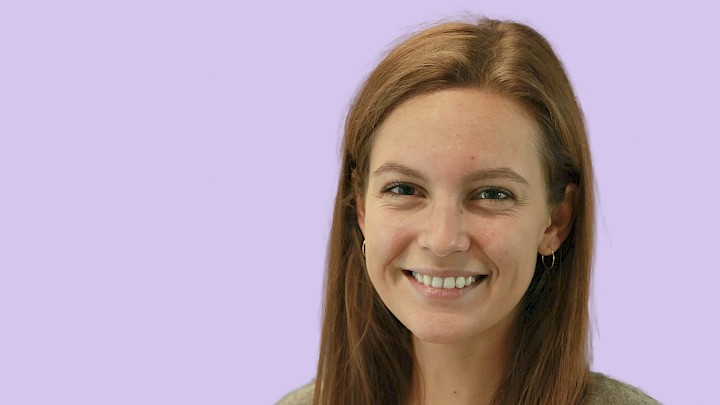
NCCR Catalysis Trailblazers: Vera Giulimondi
For our third Trailblazers feature, meet Vera Giulimondi! A recent graduate from Prof. Javier Pérez-Ramírez’ group at ETH Zurich, she won the EFCATS Best PhD Award, which was presented at EuropaCat 2025 in Trondheim! Fascinated by science and chemistry from a young age, she is a scientist at heart and was involved in multiple collaborations in academia and with industry.
Congratulations on the important recognition of your PhD work, Vera! Could you tell us about yourself and your research within NCCR Catalysis?
Within NCCR Catalysis, I was a PhD student in Prof. Javier Pérez-Ramírez’s group at ETH Zurich, working on tailoring heterogeneous catalysts with atomic precision to make chemical technologies more sustainable. Most recently, I studied platinum single-atom catalysts as replacements for toxic mercury-based catalysts in acetylene hydrochlorination, a key process in producing PVC plastic in China. My aim was to understand how platinum single-atom catalysts work and tune their structure to bring lab-developed materials closer to commercialization.
Vera setting up an automated catalyst synthesis procedure. © NCCR Catalysis
What made you consider a career in science, and what/who got you interested in science in the first place?
My career path was shaped by both my family and education. My parents always encouraged me to explore science as a child and gifted me a little alchemist set. I fell in love with it and spent days mixing things, watching colors swirl, or even making miniature explosions! But this childhood passion could only evolve into a career path thanks to dedicated teachers and professors who helped make chemistry and engineering accessible, understandable, and even more captivating.
Where are you from, and what is your background?
I’m from Italy and moved to Switzerland for my Master’s in Chemical Engineering at EPFL. I was attracted to the international environment in Swiss universities and the diverse offerings in chemistry, materials science, engineering, and sustainability. During my studies, I interned in the R&D department of a watch manufacturing company, where I saw firsthand how chemistry and materials science are applied in the industry. I also had the opportunity to conduct my Master’s thesis in the United States, focusing on electrocatalysis for CO2 reduction. This experience sparked a keen passion for catalytic technologies, which led me to join the aCe group of Prof. Javier Pérez-Ramírez at ETH Zurich.
What value has NCCR Catalysis brought to you as an early-career researcher?
NCCR Catalysis is a cradle of ideas! As a PhD student, exposure to various aspects of catalysis is an excellent stimulus for one’s research. I was able to collaborate with researchers of diverse expertise, from advanced spectroscopy to computational analyses and life-cycle assessments, respectively, with the groups of Prof. Gunnar Jeschke, Prof. Maarten Nachtegaal, Prof. Núria López and Prof. Gonzalo Guillén-Gosálbez. These interdisciplinary studies helped me gain insight into multiscale questions, from atomic-level phenomena to the economic and environmental impact of the catalytic technology we are developing.
From a personal perspective, but not of lesser importance, these collaborations have fostered lasting connections and friendships.
Vera at the NCCR Catalysis Annual Event 2022 (left) and the Annual Retreat 2023 (right). © NCCR Catalysis
What did you learn from working with industry during your PhD?
It provided valuable insights into translating fundamental science into practical solutions, considering scalability, cost-efficiency, and sustainability. A key focus of my work was highlighting the importance of toxicity analyses in early-stage catalyst development, which is essential for ensuring that the manufacturing of the new catalyst is benign to human health and the environment.
What have been your personal highlights of your time as a doctoral researcher?
A highlight of my PhD was conducting synchrotron experiments on single metal atom catalysts under reaction conditions. The challenge was bringing highly corrosive chemistry, involving halogens for vinyl chloride synthesis, to the synchrotron, requiring careful experiment design and safety assessments. Additionally, the experiments had to be completed within a tight timeframe. Overcoming these hurdles provided unique insights into catalyst behavior, making it a highly rewarding experience.
Furthermore, having the opportunity to present my results at conferences like EuropaCat 2023 in Prague, made possible by the SCNAT Chemistry Travel Award, further enriched my research through stimulating discussions and fresh perspectives.
Vera at the EuropaCat2023 conference with colleagues from the aCe research group (©). From left to right: Dr. Antonio Martín, Prof. Javier Pérez-Ramírez, Dr. Sharon Mitchell, Vera Giulimondi, and Ivan Surin.
What advice would you give other female early-career researchers in STEM?
My advice to women considering a PhD program in STEM is to choose a topic that sparks their interest and plan a clear roadmap with the help of mentors. Seek advisors who support you and challenge and stimulate your growth. Find a research environment that fosters your confidence, and consider international settings for diverse perspectives and less polarization. I also recommend joining associations and have found tremendous value in participating in events organized by women in science societies, which offer networking opportunities and inspiration from fellow female researchers.
You completed your PhD studies. What will be your next adventure?
I truly enjoy delving into fundamental research, but I am equally intrigued by the prospect of applying this knowledge to practical ends. From laboratory experimentation to commercialization, research is vital for driving innovation across different stages of development. Looking forward, I am eager to leverage the skills I have developed in my PhD studies and contribute to advancing chemical technologies for greater efficiency and sustainability.
Thank you so much for sharing your experience! Congratulations again, and we wish you the very best for your next steps.
Learn more about Vera’s research here and here, and connect with her on LinkedIn.
Congratulations on the important recognition of your PhD work, Vera! Could you tell us about yourself and your research within NCCR Catalysis?
Within NCCR Catalysis, I was a PhD student in Prof. Javier Pérez-Ramírez’s group at ETH Zurich, working on tailoring heterogeneous catalysts with atomic precision to make chemical technologies more sustainable. Most recently, I studied platinum single-atom catalysts as replacements for toxic mercury-based catalysts in acetylene hydrochlorination, a key process in producing PVC plastic in China. My aim was to understand how platinum single-atom catalysts work and tune their structure to bring lab-developed materials closer to commercialization.
Vera setting up an automated catalyst synthesis procedure. © NCCR Catalysis
What made you consider a career in science, and what/who got you interested in science in the first place?
My career path was shaped by both my family and education. My parents always encouraged me to explore science as a child and gifted me a little alchemist set. I fell in love with it and spent days mixing things, watching colors swirl, or even making miniature explosions! But this childhood passion could only evolve into a career path thanks to dedicated teachers and professors who helped make chemistry and engineering accessible, understandable, and even more captivating.
Where are you from, and what is your background?
I’m from Italy and moved to Switzerland for my Master’s in Chemical Engineering at EPFL. I was attracted to the international environment in Swiss universities and the diverse offerings in chemistry, materials science, engineering, and sustainability. During my studies, I interned in the R&D department of a watch manufacturing company, where I saw firsthand how chemistry and materials science are applied in the industry. I also had the opportunity to conduct my Master’s thesis in the United States, focusing on electrocatalysis for CO2 reduction. This experience sparked a keen passion for catalytic technologies, which led me to join the aCe group of Prof. Javier Pérez-Ramírez at ETH Zurich.
What value has NCCR Catalysis brought to you as an early-career researcher?
NCCR Catalysis is a cradle of ideas! As a PhD student, exposure to various aspects of catalysis is an excellent stimulus for one’s research. I was able to collaborate with researchers of diverse expertise, from advanced spectroscopy to computational analyses and life-cycle assessments, respectively, with the groups of Prof. Gunnar Jeschke, Prof. Maarten Nachtegaal, Prof. Núria López and Prof. Gonzalo Guillén-Gosálbez. These interdisciplinary studies helped me gain insight into multiscale questions, from atomic-level phenomena to the economic and environmental impact of the catalytic technology we are developing.
From a personal perspective, but not of lesser importance, these collaborations have fostered lasting connections and friendships.
Vera at the NCCR Catalysis Annual Event 2022 (left) and the Annual Retreat 2023 (right). © NCCR Catalysis
What did you learn from working with industry during your PhD?
It provided valuable insights into translating fundamental science into practical solutions, considering scalability, cost-efficiency, and sustainability. A key focus of my work was highlighting the importance of toxicity analyses in early-stage catalyst development, which is essential for ensuring that the manufacturing of the new catalyst is benign to human health and the environment.
What have been your personal highlights of your time as a doctoral researcher?
A highlight of my PhD was conducting synchrotron experiments on single metal atom catalysts under reaction conditions. The challenge was bringing highly corrosive chemistry, involving halogens for vinyl chloride synthesis, to the synchrotron, requiring careful experiment design and safety assessments. Additionally, the experiments had to be completed within a tight timeframe. Overcoming these hurdles provided unique insights into catalyst behavior, making it a highly rewarding experience.
Furthermore, having the opportunity to present my results at conferences like EuropaCat 2023 in Prague, made possible by the SCNAT Chemistry Travel Award, further enriched my research through stimulating discussions and fresh perspectives.
Vera at the EuropaCat2023 conference with colleagues from the aCe research group (©). From left to right: Dr. Antonio Martín, Prof. Javier Pérez-Ramírez, Dr. Sharon Mitchell, Vera Giulimondi, and Ivan Surin.
What advice would you give other female early-career researchers in STEM?
My advice to women considering a PhD program in STEM is to choose a topic that sparks their interest and plan a clear roadmap with the help of mentors. Seek advisors who support you and challenge and stimulate your growth. Find a research environment that fosters your confidence, and consider international settings for diverse perspectives and less polarization. I also recommend joining associations and have found tremendous value in participating in events organized by women in science societies, which offer networking opportunities and inspiration from fellow female researchers.
You completed your PhD studies. What will be your next adventure?
I truly enjoy delving into fundamental research, but I am equally intrigued by the prospect of applying this knowledge to practical ends. From laboratory experimentation to commercialization, research is vital for driving innovation across different stages of development. Looking forward, I am eager to leverage the skills I have developed in my PhD studies and contribute to advancing chemical technologies for greater efficiency and sustainability.
Thank you so much for sharing your experience! Congratulations again, and we wish you the very best for your next steps.
Learn more about Vera’s research here and here, and connect with her on LinkedIn.
16.7.2024

Recipients of 2024 Young Talents Fellowship
We’re excited to announce the four recipients of our 2024 Young Talents Fellowship, who will begin their Master’s theses within our member groups in 2024 and 2025. Congratulations and welcome to our network, Aline, Shaipranesh, Nadiia, and Julia!
Aline Hartgers, from Belgium, studies Mathematical Engineering at KU Leuven, and will join Prof. Kjell Jorner’s group at ETH Zürich.
Shaipranesh Senthilkumar, from India, studies Computer Science & Chemistry at BITS Pilani and will join Prof. Philippe Schwaller’s group at EPFL.
Nadiia Vorontsova, from Ukraine, studies Chemistry at the University of Geneva, where she will join Prof. Ross Milton's group.
Julia Ravagnani, from Italy and France, studies Sustainable Chemical Engineering at EPFL and will join Prof. Gonzalo Guillén-Gosálbez's group at ETH Zurich.
The Young Talents Fellowship supports students with exceptional academic records and diverse backgrounds. It provides them with the opportunity to conduct a Master’s thesis project in a research group associated with NCCR Catalysis and establish their connections and ideas in a multidisciplinary, cross-fertilizing environment of research excellence. This initiative to promote fair representation in catalysis research was launched in 2022.
Aline Hartgers, from Belgium, studies Mathematical Engineering at KU Leuven, and will join Prof. Kjell Jorner’s group at ETH Zürich.
Shaipranesh Senthilkumar, from India, studies Computer Science & Chemistry at BITS Pilani and will join Prof. Philippe Schwaller’s group at EPFL.
Nadiia Vorontsova, from Ukraine, studies Chemistry at the University of Geneva, where she will join Prof. Ross Milton's group.
Julia Ravagnani, from Italy and France, studies Sustainable Chemical Engineering at EPFL and will join Prof. Gonzalo Guillén-Gosálbez's group at ETH Zurich.
The Young Talents Fellowship supports students with exceptional academic records and diverse backgrounds. It provides them with the opportunity to conduct a Master’s thesis project in a research group associated with NCCR Catalysis and establish their connections and ideas in a multidisciplinary, cross-fertilizing environment of research excellence. This initiative to promote fair representation in catalysis research was launched in 2022.
27.6.2024
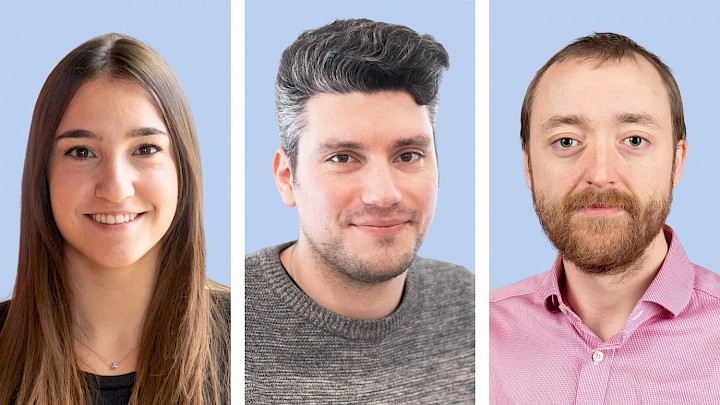
From Spain to Switzerland: a lab exchange between computational and experimental researchers
Team portrait, from left to right: Andrea Ruiz-Ferrando, Dr. Javier Heras-Domingo, and Dr. Adam Clark.In March, two researchers from ICIQ in Spain came to PSI and ETH Zurich, Switzerland for a one-week lab exchange supported through the NCCR Catalysis Catalyzer Program. Meet Andrea Ruiz-Ferrando and Dr. Javier Heras-Domingo, who share their impressions from their exchange hosted by Dr. Adam Clark, and their experiences on bridging the gap between experimental and computational groups!
Hi Andrea and Javi, could you tell us about yourselves and your research within NCCR Catalysis?Andrea: I hold a degree in chemistry and have been a PhD student in the group of Prof. Núria López at ICIQ since 2020. My research is centered on the fascinating realm of single-atom catalysts within the domain of theoretical chemistry. Specifically, I delve into finding experimentally guided synthesis-structure-property relationships inherent to these catalytic systems. What makes my work particularly exciting is the interdisciplinary nature of my approach: I collaborate with experimentalists, bridging the gap between theory and practice. I enjoy engaging in social activities, whether it’s exploring new places or meeting new people, and the lab exchange was a great opportunity for this.Javi: Originally from Barcelona, I completed my PhD in Computational Chemistry at the Universitat Autònoma de Barcelona. My academic journey then took me to the United States, where I spent three enriching years at Carnegie Mellon University for my first postdoctoral researcher position. During this time, I collaborated with Facebook AI to dive into data science and deep learning approaches applied to chemistry and, in particular, to heterogeneous catalysis. Nowadays, I’m a postdoctoral researcher in Prof. Núria López’s research group, focusing on pushing the boundaries of characterization techniques leveraging the power of artificial intelligence (AI), with the aim to extract more quantitative data that will help to design better catalysts with tailored properties.Javi, Andrea and Adam in front of PSI’s Swiss Light Source facilities (left), and Javi and Adam discussing their project (right).How did the collaboration between the López, Pérez-Ramírez groups and Dr. Adam Clark emerge, and what insights have you gained from this collaboration?Javi: The smart characterization research line originated from a collaborative effort between Prof. Núria López’s group at ICIQ, Prof. Javier Pérez-Ramírez at ETH Zurich, and the Barcelona Supercomputing Center (BSC), implementing a deep learning model to detect single-atom catalysts via electron microscopy back in the pandemic. Our current project, a collaboration between ICIQ, ETH, and PSI, aims to enhance catalyst design through advanced characterization strategies, leveraging automated data generation and AI in synchrotron-based techniques like XANES (X-ray Absorption Near Edge Structure) and EXAFS (Extended X-ray Absorption Fine Structure). This approach promises advancements in catalysis, with far-reaching socio-economic impacts.You recently did a one-week lab exchange at PSI and ETH Zurich, Switzerland. How has this exchange benefited you as researchers and the project?Javi: The Catalyzer Program we recently participated in has proven to be an invaluable asset for advancing our current research project. During an intensive one-week laboratory exchange, we gained profound insights into the intricacies of extracting data from EXAFS spectra. This hands-on experience has significantly enriched our understanding, placing us in a much stronger position to incorporate AI into enhancing this technique. The knowledge and techniques acquired through this program have not only bolstered our research capabilities but also opened new avenues for innovation in applying AI to improve data analysis and extraction methods in our field.Andrea, Adam, and Javi having dinner with Dr. Olga Safonova, NCCR Catalysis Principal Investigator at PSI (left), and Javi and Andrea meeting with Vera Giulimondi and Dr. Sharon Mitchell from the group of NCCR Catalysis Director Prof. Javier Pérez-Ramírez at ETH Zurich (right).What advice would you give other early-career researchers on collaborations and exchanges between labs?Andrea: Forge fruitful collaborations by actively seeking shared interests and laying the foundation with ontologies - the common language that ensures effective communication. Embrace diverse perspectives to collaboratively define the project's scope and determine the correct methodology for seamless progress. Be adaptable to changes and uncertainties, cultivating a collaborative mindset that views differences as opportunities for collective growth. Ensure the adoption of an integrative approach right from the outset, emphasizing a cooperative evolution of the project. This proactive stand prevents potential misconceptions and exploits synergistic relationships across research groups.What will be the next steps in your collaboration?Andrea & Javi: The next phase of our collaboration is set to significantly enhance our AI method by integrating experimental data. This pivotal step will not only broaden the method’s applicability but also ensure its robustness in predicting outcomes in experimental environments. Such a move is essential, as relying solely on theoretical data limits our understanding and the potential for real-world applications. Incorporating experimental insights will equip our AI approach with a much-needed depth, making it a more general and powerful tool for navigating the complexities of experimental conditions.Thank you so much for sharing your experience! We wish you and your colleagues the very best for your project.
Learn more about Andrea’s research here and here, and connect with her on Twitter/X and LinkedIn. Learn more about Javier’s research here and here, and connect with him on Twitter/X and LinkedIn.
Hi Andrea and Javi, could you tell us about yourselves and your research within NCCR Catalysis?Andrea: I hold a degree in chemistry and have been a PhD student in the group of Prof. Núria López at ICIQ since 2020. My research is centered on the fascinating realm of single-atom catalysts within the domain of theoretical chemistry. Specifically, I delve into finding experimentally guided synthesis-structure-property relationships inherent to these catalytic systems. What makes my work particularly exciting is the interdisciplinary nature of my approach: I collaborate with experimentalists, bridging the gap between theory and practice. I enjoy engaging in social activities, whether it’s exploring new places or meeting new people, and the lab exchange was a great opportunity for this.Javi: Originally from Barcelona, I completed my PhD in Computational Chemistry at the Universitat Autònoma de Barcelona. My academic journey then took me to the United States, where I spent three enriching years at Carnegie Mellon University for my first postdoctoral researcher position. During this time, I collaborated with Facebook AI to dive into data science and deep learning approaches applied to chemistry and, in particular, to heterogeneous catalysis. Nowadays, I’m a postdoctoral researcher in Prof. Núria López’s research group, focusing on pushing the boundaries of characterization techniques leveraging the power of artificial intelligence (AI), with the aim to extract more quantitative data that will help to design better catalysts with tailored properties.Javi, Andrea and Adam in front of PSI’s Swiss Light Source facilities (left), and Javi and Adam discussing their project (right).How did the collaboration between the López, Pérez-Ramírez groups and Dr. Adam Clark emerge, and what insights have you gained from this collaboration?Javi: The smart characterization research line originated from a collaborative effort between Prof. Núria López’s group at ICIQ, Prof. Javier Pérez-Ramírez at ETH Zurich, and the Barcelona Supercomputing Center (BSC), implementing a deep learning model to detect single-atom catalysts via electron microscopy back in the pandemic. Our current project, a collaboration between ICIQ, ETH, and PSI, aims to enhance catalyst design through advanced characterization strategies, leveraging automated data generation and AI in synchrotron-based techniques like XANES (X-ray Absorption Near Edge Structure) and EXAFS (Extended X-ray Absorption Fine Structure). This approach promises advancements in catalysis, with far-reaching socio-economic impacts.You recently did a one-week lab exchange at PSI and ETH Zurich, Switzerland. How has this exchange benefited you as researchers and the project?Javi: The Catalyzer Program we recently participated in has proven to be an invaluable asset for advancing our current research project. During an intensive one-week laboratory exchange, we gained profound insights into the intricacies of extracting data from EXAFS spectra. This hands-on experience has significantly enriched our understanding, placing us in a much stronger position to incorporate AI into enhancing this technique. The knowledge and techniques acquired through this program have not only bolstered our research capabilities but also opened new avenues for innovation in applying AI to improve data analysis and extraction methods in our field.Andrea, Adam, and Javi having dinner with Dr. Olga Safonova, NCCR Catalysis Principal Investigator at PSI (left), and Javi and Andrea meeting with Vera Giulimondi and Dr. Sharon Mitchell from the group of NCCR Catalysis Director Prof. Javier Pérez-Ramírez at ETH Zurich (right).What advice would you give other early-career researchers on collaborations and exchanges between labs?Andrea: Forge fruitful collaborations by actively seeking shared interests and laying the foundation with ontologies - the common language that ensures effective communication. Embrace diverse perspectives to collaboratively define the project's scope and determine the correct methodology for seamless progress. Be adaptable to changes and uncertainties, cultivating a collaborative mindset that views differences as opportunities for collective growth. Ensure the adoption of an integrative approach right from the outset, emphasizing a cooperative evolution of the project. This proactive stand prevents potential misconceptions and exploits synergistic relationships across research groups.What will be the next steps in your collaboration?Andrea & Javi: The next phase of our collaboration is set to significantly enhance our AI method by integrating experimental data. This pivotal step will not only broaden the method’s applicability but also ensure its robustness in predicting outcomes in experimental environments. Such a move is essential, as relying solely on theoretical data limits our understanding and the potential for real-world applications. Incorporating experimental insights will equip our AI approach with a much-needed depth, making it a more general and powerful tool for navigating the complexities of experimental conditions.Thank you so much for sharing your experience! We wish you and your colleagues the very best for your project.
Learn more about Andrea’s research here and here, and connect with her on Twitter/X and LinkedIn. Learn more about Javier’s research here and here, and connect with him on Twitter/X and LinkedIn.
16.5.2024

NCCR Catalysis Trailblazers: Anastasiia Komarova
For our second Trailblazers feature, meet Dr. Anastasiia Komarova (she/her) from EPFL in the group of Prof. Jeremy Luterbacher! She has been working across three continents with the goal of engineering a greener future in chemistry. During her PhD studies, she filed three patents and received several awards.Hi Anastasiia, could you tell us about yourself and your research within NCCR Catalysis?
With pleasure! I am a PhD researcher at Jeremy Luterbacher’s group at EPFL. My research, supported by NCCR Catalysis, focuses on developing a novel class of green solvents from non-edible lignocellulosic biomass. Imagine starting with something as simple as corn cobs in the flask – and then watching the magic of chemistry unfold to create valuable nature-inspired chemical products! Our new solvents offer a renewable alternative to traditional toxic and fossil-derived counterparts. We now see growing interest in our solvents from industry and research institutions as they shift toward more sustainable practices. That’s why we’ve recently scaled up solvent production to a multi-kg scale to ensure everyone can get a sample to try! Outside the lab, you might find me playing the keys in the music band or hitting tennis balls – activities that keep my creative energies flowing!Anastasiia showcasing a novel green solvent made from biomass at EPFL (left) and performing with her band at Fécule Festival in 2023 organized by the University of Lausanne (right).What made you consider a career in science, and what/who got you interested in science in the first place?As a teenager, I enjoyed chemistry, biology, and math classes - though I wasn't the quintessential science geek. When figuring out what to do after high school, I sought advice from my family. Most of them said something like, “Pick anything but what I do for a living”. The only exceptions were my uncle and aunt, both brilliant scientists, who advised me to “go for science like we did! Do chemistry; it’s really cool!”. I've never regretted this choice and am grateful to them for inspiring my career path in science!Where are you from and what is your background?
I was born and raised in Siberia, Russia. After highschool, I enrolled in a prestigious and competitive Chemistry program at Novosibirsk State University in Akademgorodok, a unique place surrounded by Siberian nature and renowned research institutions just outside the bustling city of Novosibirsk. During my studies, I worked with scientists from these institutions to complete both my Bachelor’s and Master’s theses. I was a proactive student and seized every opportunity to gain new experience. This drive first led me to explore the academic world in Europe (Italy), and then in the USA, where I worked for a while as a researcher. Inspired by these international experiences, I decided to pursue a PhD position abroad and ultimately chose EPFL in Switzerland! To me, Lausanne has a somewhat similar vibe to the one I experienced in Akadem: collaborative, friendly, and intellectually vibrant.What value has NCCR Catalysis brought to you as an early-career researcher?
NCCR Catalysis opened the door for me to a unique community of leading experts across various branches of chemistry. This opportunity allowed me to find key collaborators for my doctoral project. Together, we elevated this work to new heights, something I couldn't have achieved on my own. Plus, presenting my research at several NCCR Catalysis Annual Meetings was a fantastic experience. I got a ton of helpful feedback, won the best talk prize once, and made valuable connections in my field.Anastasiia presenting at the NCCR Catalysis Annual Retreat 2022 (left), where she received a best talk prize, awarded by Dr. Sharon Mitchell, Program Advisor, and Prof. Jérôme Waser, Co-Director (right). © NCCR CatalysisDuring your doctoral degree, you had three patents granted. Could you tell us about this experience, and how it enriched your studies?
Patenting your inventions is very exciting! It means that the technology or product you are developing has practical value and might one day hit the market. The patenting process, though, is quite complex and vastly different from writing a research article. Fortunately, I wasn’t alone on this journey. I received a lot of support from our Technology Transfer Office on campus, and I even took a course offered by EPFL to learn more about what patent attorneys usually do. This experience was a valuable part of my doctoral studies and also revealed an interesting alternative career path for researchers in STEM like myself.What advice would you give other female early-career researchers in STEM?
Networking, networking, and once again… networking! Join events, conferences, and mentorship programs where you can connect with industry experts and great scientists. Learn how to effectively communicate your research to people with different backgrounds - you can even practice with your grandparents or younger siblings! Don’t be afraid of changing your research area as you transition from the Bachelor’s to Master’s and then to the PhD level. But always prioritize finding the right advisor and supportive work environment over the specific research project. Above all, be kind to yourself and trust your intuition!Anastasiia presenting her NCCR Catalysis work (left) and receiving the Runner-up Award for Best Oral Presentation in Catalysis Sciences & Engineering from the Swiss Chemical Society at the Fall Meeting 2023, awarded by Markus Steinke, representative of Metrohm (right). © Swiss Chemical SocietyYou recently obtained your doctoral degree - congratulations! What will be your next adventure?
Thank you! Right after passing my PhD defense, I embarked on my next adventure by flying to an island in the middle of the Atlantic Ocean to rest and reflect on what I wanted to do next. After completing PhD, you have so many options! I am flexible and open to all opportunities, from continuing in academia as a postdoc to making a leap to industry jobs in R&D or process development. Additionally, here in Switzerland, there's a plethora of startup companies. Why not consider joining one or even founding a new one? 😊Thank you so much for sharing your experience! We wish you the very best for your next steps.
Learn more about Anastasiia’s research here and connect with her on LinkedIn and Instagram.
With pleasure! I am a PhD researcher at Jeremy Luterbacher’s group at EPFL. My research, supported by NCCR Catalysis, focuses on developing a novel class of green solvents from non-edible lignocellulosic biomass. Imagine starting with something as simple as corn cobs in the flask – and then watching the magic of chemistry unfold to create valuable nature-inspired chemical products! Our new solvents offer a renewable alternative to traditional toxic and fossil-derived counterparts. We now see growing interest in our solvents from industry and research institutions as they shift toward more sustainable practices. That’s why we’ve recently scaled up solvent production to a multi-kg scale to ensure everyone can get a sample to try! Outside the lab, you might find me playing the keys in the music band or hitting tennis balls – activities that keep my creative energies flowing!Anastasiia showcasing a novel green solvent made from biomass at EPFL (left) and performing with her band at Fécule Festival in 2023 organized by the University of Lausanne (right).What made you consider a career in science, and what/who got you interested in science in the first place?As a teenager, I enjoyed chemistry, biology, and math classes - though I wasn't the quintessential science geek. When figuring out what to do after high school, I sought advice from my family. Most of them said something like, “Pick anything but what I do for a living”. The only exceptions were my uncle and aunt, both brilliant scientists, who advised me to “go for science like we did! Do chemistry; it’s really cool!”. I've never regretted this choice and am grateful to them for inspiring my career path in science!Where are you from and what is your background?
I was born and raised in Siberia, Russia. After highschool, I enrolled in a prestigious and competitive Chemistry program at Novosibirsk State University in Akademgorodok, a unique place surrounded by Siberian nature and renowned research institutions just outside the bustling city of Novosibirsk. During my studies, I worked with scientists from these institutions to complete both my Bachelor’s and Master’s theses. I was a proactive student and seized every opportunity to gain new experience. This drive first led me to explore the academic world in Europe (Italy), and then in the USA, where I worked for a while as a researcher. Inspired by these international experiences, I decided to pursue a PhD position abroad and ultimately chose EPFL in Switzerland! To me, Lausanne has a somewhat similar vibe to the one I experienced in Akadem: collaborative, friendly, and intellectually vibrant.What value has NCCR Catalysis brought to you as an early-career researcher?
NCCR Catalysis opened the door for me to a unique community of leading experts across various branches of chemistry. This opportunity allowed me to find key collaborators for my doctoral project. Together, we elevated this work to new heights, something I couldn't have achieved on my own. Plus, presenting my research at several NCCR Catalysis Annual Meetings was a fantastic experience. I got a ton of helpful feedback, won the best talk prize once, and made valuable connections in my field.Anastasiia presenting at the NCCR Catalysis Annual Retreat 2022 (left), where she received a best talk prize, awarded by Dr. Sharon Mitchell, Program Advisor, and Prof. Jérôme Waser, Co-Director (right). © NCCR CatalysisDuring your doctoral degree, you had three patents granted. Could you tell us about this experience, and how it enriched your studies?
Patenting your inventions is very exciting! It means that the technology or product you are developing has practical value and might one day hit the market. The patenting process, though, is quite complex and vastly different from writing a research article. Fortunately, I wasn’t alone on this journey. I received a lot of support from our Technology Transfer Office on campus, and I even took a course offered by EPFL to learn more about what patent attorneys usually do. This experience was a valuable part of my doctoral studies and also revealed an interesting alternative career path for researchers in STEM like myself.What advice would you give other female early-career researchers in STEM?
Networking, networking, and once again… networking! Join events, conferences, and mentorship programs where you can connect with industry experts and great scientists. Learn how to effectively communicate your research to people with different backgrounds - you can even practice with your grandparents or younger siblings! Don’t be afraid of changing your research area as you transition from the Bachelor’s to Master’s and then to the PhD level. But always prioritize finding the right advisor and supportive work environment over the specific research project. Above all, be kind to yourself and trust your intuition!Anastasiia presenting her NCCR Catalysis work (left) and receiving the Runner-up Award for Best Oral Presentation in Catalysis Sciences & Engineering from the Swiss Chemical Society at the Fall Meeting 2023, awarded by Markus Steinke, representative of Metrohm (right). © Swiss Chemical SocietyYou recently obtained your doctoral degree - congratulations! What will be your next adventure?
Thank you! Right after passing my PhD defense, I embarked on my next adventure by flying to an island in the middle of the Atlantic Ocean to rest and reflect on what I wanted to do next. After completing PhD, you have so many options! I am flexible and open to all opportunities, from continuing in academia as a postdoc to making a leap to industry jobs in R&D or process development. Additionally, here in Switzerland, there's a plethora of startup companies. Why not consider joining one or even founding a new one? 😊Thank you so much for sharing your experience! We wish you the very best for your next steps.
Learn more about Anastasiia’s research here and connect with her on LinkedIn and Instagram.
8.3.2024

NCCR Catalysis Trailblazers: Alessandra Toniato
We’re kicking off the NCCR Catalysis Trailblazers series on exceptional individuals breaking barriers and making waves in research! On International Women's Day, meet Alessandra Toniato (she/her), a PhD researcher at IBM Research in Dr. Teodoro Laino’s team. In her ~3.5 years of doctoral research, she contributed to over seven publications and became a mother twice.Hi Alessandra, could you tell us about yourself and your research within NCCR Catalysis?
Sure! There is only one thing I like to discuss more than my work - my kids! In the context of NCCR Catalysis, I am a PhD researcher leveraging AI to solve complex chemical problems. In particular, I have been working extensively on data curation and retrosynthesis, the crucial task of inferring the building blocks needed to obtain a target compound.
Alessandra at the NCCR Catalysis Annual Event 2022 (left) and Y3 Annual Review Meeting 2023 (right). © NCCR CatalysisWhat made you consider a career in science, and who got you interested in science in the first place?
When we make our choices, we are all influenced by our heroes. I have always had a strong bond with my parents. While my mother taught me how important it is for a woman to work, my dad got me into science. He is a mechanical engineer, and I have always dreamed of becoming like him. “L’uomo buono desidera conoscere” (The good man desires to know) he frequently says. Instead of buying a new dishwasher, he tries to fix the old one just to determine which was the problem.During your doctoral studies, you became a mother twice. How have you balanced work and family duties, and how did your environment support you?
It was not trivial. The balance between work and family is not stable. There are periods in which it is easier and others in which you need to hand in a project while your child is sick. In these moments, the support of my husband was and is crucial: we split the fatigue. On top of that, my manager was always sensitive to the situation: I never had to stick to fixed working hours or on-site work. Taking the kids to the doctor was never a problem.
When I became a mum, I knew that sending my children to the Kita (daycare center) was an investment for their social development and my career. Still, the Kita cost in Switzerland for two kids is more than my net salary. Thanks to the NCCR Flexibility Grant, I was able to alleviate that cost.
It is absurd how little support families (women) receive in the most challenging years of parenthood.
What advice would you give other female early-stage researchers regarding parenthood?
First, don’t wait for the perfect moment to have a family. If you desire it, just do it. Once you are in, you will find time for everything. And second, be clear about your priorities. Of course, you will not be able to work overtime, but this does not mean you cannot do your job. You will always feel as if you are not working enough or spending enough time with your kids: that’s normal; it’s part of the game.
But remember, no perfect mum or situation exists.
Alessandra and colleagues of the RXN for Chemistry Project Team received the 2022 Sandmeyer Award from the Swiss Chemical Society at the Swiss Chemistry Science Night 2022. © Swiss Chemical SocietyYou recently obtained your doctoral degree - congratulations! What will be your next adventure?
Thank you! I still haven’t realized it yet! I am open to different opportunities, possibly still in the technical field of Artificial Intelligence. My only condition for my future job is flexibility: I love to be a mum and spend time with my kids, and I will not renounce this. I believe the world is slowly understanding that it is not important how many hours you stay in the office, but how you work.Thank you so much for sharing your experience! We wish you the very best for your next steps.
Learn more about Alessandra’s research here and connect with her on Twitter/X and LinkedIn.
Sure! There is only one thing I like to discuss more than my work - my kids! In the context of NCCR Catalysis, I am a PhD researcher leveraging AI to solve complex chemical problems. In particular, I have been working extensively on data curation and retrosynthesis, the crucial task of inferring the building blocks needed to obtain a target compound.
Alessandra at the NCCR Catalysis Annual Event 2022 (left) and Y3 Annual Review Meeting 2023 (right). © NCCR CatalysisWhat made you consider a career in science, and who got you interested in science in the first place?
When we make our choices, we are all influenced by our heroes. I have always had a strong bond with my parents. While my mother taught me how important it is for a woman to work, my dad got me into science. He is a mechanical engineer, and I have always dreamed of becoming like him. “L’uomo buono desidera conoscere” (The good man desires to know) he frequently says. Instead of buying a new dishwasher, he tries to fix the old one just to determine which was the problem.During your doctoral studies, you became a mother twice. How have you balanced work and family duties, and how did your environment support you?
It was not trivial. The balance between work and family is not stable. There are periods in which it is easier and others in which you need to hand in a project while your child is sick. In these moments, the support of my husband was and is crucial: we split the fatigue. On top of that, my manager was always sensitive to the situation: I never had to stick to fixed working hours or on-site work. Taking the kids to the doctor was never a problem.
When I became a mum, I knew that sending my children to the Kita (daycare center) was an investment for their social development and my career. Still, the Kita cost in Switzerland for two kids is more than my net salary. Thanks to the NCCR Flexibility Grant, I was able to alleviate that cost.
It is absurd how little support families (women) receive in the most challenging years of parenthood.
What advice would you give other female early-stage researchers regarding parenthood?
First, don’t wait for the perfect moment to have a family. If you desire it, just do it. Once you are in, you will find time for everything. And second, be clear about your priorities. Of course, you will not be able to work overtime, but this does not mean you cannot do your job. You will always feel as if you are not working enough or spending enough time with your kids: that’s normal; it’s part of the game.
But remember, no perfect mum or situation exists.
Alessandra and colleagues of the RXN for Chemistry Project Team received the 2022 Sandmeyer Award from the Swiss Chemical Society at the Swiss Chemistry Science Night 2022. © Swiss Chemical SocietyYou recently obtained your doctoral degree - congratulations! What will be your next adventure?
Thank you! I still haven’t realized it yet! I am open to different opportunities, possibly still in the technical field of Artificial Intelligence. My only condition for my future job is flexibility: I love to be a mum and spend time with my kids, and I will not renounce this. I believe the world is slowly understanding that it is not important how many hours you stay in the office, but how you work.Thank you so much for sharing your experience! We wish you the very best for your next steps.
Learn more about Alessandra’s research here and connect with her on Twitter/X and LinkedIn.
13.12.2023
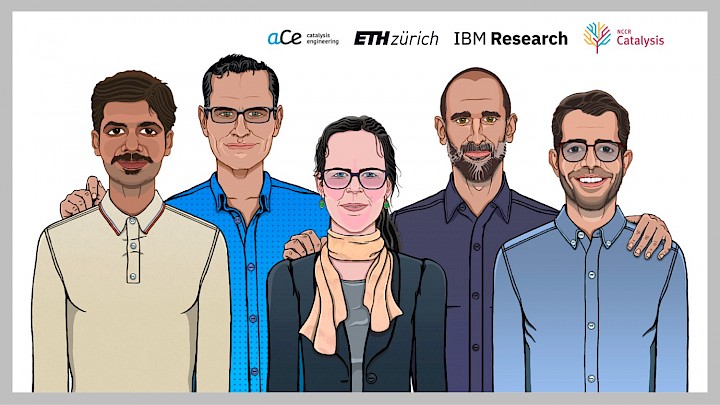
Accelerating synthesis planning for heterogeneous catalysis
Team portrait, from left to right: Manu Suvarna, Prof. Javier Pérez-Ramírez, Dr. Sharon Mitchell, Dr. Teodoro Laino, Dr. Alain Claude Vaucher. © Javier Pérez-Ramírez
In a recent collaborative publication, a team of experimental and computational experts from two NCCR Catalysis member groups have explored language models and protocol standardization guidelines to speed up synthesis planning for heterogeneous catalysts. Learn more about the work from Manu Suvarna, Dr. Sharon Mitchell and Prof. Javier Pérez-Ramírez (aCe lab, ETHZ) and Dr. Alain Vaucher and Dr. Teodoro Laino (IBM Research Zurich)!
Can you briefly introduce the concept of the project and your role?
Manu: Our project aimed at developing an automated pipeline via machine learning (ML) for the extraction of experimental synthesis procedures of single atom heterogeneous catalysts (SACs) from published literature. We used the compiled data to statistically analyze trends in SAC synthesis procedure. Eventually, based on the learning experience through the project, we identified current limitations in the way SAC-based synthesis procedures are reported, and provided guidelines to write them effectively in machine readable formats. As a PhD researcher, I wore various hats during the project, but my most important role was to translate a catalysis-oriented task into an ML problem, and serve as a bridge for exchange of insights and inferences between the two communities.
How did the collaboration between ML experts and experimental researchers come about?
Teo: The collaboration between ML experts and experimental researchers was a seamless interaction of individuals fluent in different languages - algorithms and empirical experimentation. This partnership thrived on a constant feedback loop, where ML insights informed experimental design and vice versa, elevating the quality of our research. Manu played a pivotal role by fostering curiosity and openness to learning from the ML perspective, creating an environment where diverse viewpoints flourished. This collaboration exemplifies the power of NCCR Catalysis and consequently of interdisciplinary teamwork in driving innovative breakthroughs at the intersection of technology and empirical research.
How did your experience working with experimental researchers help advance your text mining model?
Alain: The model's success was determined by its usefulness for the experimental researchers, not merely by its numerical performance. As such, we focused on tweaking the model to effectively extract what is relevant in SAC syntheses. With Manu's valuable insights, we identified and iteratively refined the model's weaknesses, ensuring it evolved to meet the precise needs of experimental researchers in this domain.
Were there any unexpected challenges that arose during the collaboration, and how did you address them?
Manu: From a technical point of view, the biggest challenge we faced was the impact of lack of data standards on model performance. Based on our experience through this project, we believe that current catalysis and chemistry literature may not be sufficiently ready to capitalize on all the benefits of language models and ML tools. In our study, we address these limitations by recommending guidelines for protocol standardization to improve machine readability. As Teo mentioned earlier, this was made possible by working in an environment where we seamlessly exchanged knowledge and shared our learning curves, to come up with an innovative solution by leveraging our respective expertise in experimental catalysis and ML.
What message or insight do you hope readers take away from your collaborative work?
Sharon: A significant takeaway is the need for experimentalists to reconsider traditional approaches in reporting synthetic protocols. In light of the crucial aspect of reproducibility of experimental results, embracing machine readable formats, like tables submitted as data files alongside articles, could greatly facilitate the integration of ML approaches to accelerate research.
Where do you see the intersection of ML and experimental research heading in the field of heterogeneous catalysis?
Teo & Manu: ML algorithms are increasingly being employed to predict catalytic properties, optimize catalyst designs, and accelerate the discovery of novel materials. The intersection of the two fields will lead to the creation of better datasets, predictive models, which will help researchers identify promising catalysts, reducing time and costs involved in experimentation. However, the field is still in its infancy and there is significant potential for the greater adoption of data-driven workflows in routine experimental works with enormous implications for chemical industry and the environment.
What role has NCCR Catalysis played in developing this work?
Javier: When we conceived NCCR Catalysis at the end of the last decade, we dreamed of studies like this one, at the interface of experimental and digital catalysis. With a cutting-edge program embracing experts in different domains, the dream has become a reality.
Publication details:
Language models and protocol standardization guidelines for accelerating synthesis planning in heterogeneous catalysis. M. Suvarna, A.C. Vaucher, S. Mitchell, T. Laino, J. Pérez-Ramírez. Nat. Commun. 2023, 14, 7964. DOI: 10.1038/s41467-023-43836-5.
In a recent collaborative publication, a team of experimental and computational experts from two NCCR Catalysis member groups have explored language models and protocol standardization guidelines to speed up synthesis planning for heterogeneous catalysts. Learn more about the work from Manu Suvarna, Dr. Sharon Mitchell and Prof. Javier Pérez-Ramírez (aCe lab, ETHZ) and Dr. Alain Vaucher and Dr. Teodoro Laino (IBM Research Zurich)!
Can you briefly introduce the concept of the project and your role?
Manu: Our project aimed at developing an automated pipeline via machine learning (ML) for the extraction of experimental synthesis procedures of single atom heterogeneous catalysts (SACs) from published literature. We used the compiled data to statistically analyze trends in SAC synthesis procedure. Eventually, based on the learning experience through the project, we identified current limitations in the way SAC-based synthesis procedures are reported, and provided guidelines to write them effectively in machine readable formats. As a PhD researcher, I wore various hats during the project, but my most important role was to translate a catalysis-oriented task into an ML problem, and serve as a bridge for exchange of insights and inferences between the two communities.
How did the collaboration between ML experts and experimental researchers come about?
Teo: The collaboration between ML experts and experimental researchers was a seamless interaction of individuals fluent in different languages - algorithms and empirical experimentation. This partnership thrived on a constant feedback loop, where ML insights informed experimental design and vice versa, elevating the quality of our research. Manu played a pivotal role by fostering curiosity and openness to learning from the ML perspective, creating an environment where diverse viewpoints flourished. This collaboration exemplifies the power of NCCR Catalysis and consequently of interdisciplinary teamwork in driving innovative breakthroughs at the intersection of technology and empirical research.
How did your experience working with experimental researchers help advance your text mining model?
Alain: The model's success was determined by its usefulness for the experimental researchers, not merely by its numerical performance. As such, we focused on tweaking the model to effectively extract what is relevant in SAC syntheses. With Manu's valuable insights, we identified and iteratively refined the model's weaknesses, ensuring it evolved to meet the precise needs of experimental researchers in this domain.
Were there any unexpected challenges that arose during the collaboration, and how did you address them?
Manu: From a technical point of view, the biggest challenge we faced was the impact of lack of data standards on model performance. Based on our experience through this project, we believe that current catalysis and chemistry literature may not be sufficiently ready to capitalize on all the benefits of language models and ML tools. In our study, we address these limitations by recommending guidelines for protocol standardization to improve machine readability. As Teo mentioned earlier, this was made possible by working in an environment where we seamlessly exchanged knowledge and shared our learning curves, to come up with an innovative solution by leveraging our respective expertise in experimental catalysis and ML.
What message or insight do you hope readers take away from your collaborative work?
Sharon: A significant takeaway is the need for experimentalists to reconsider traditional approaches in reporting synthetic protocols. In light of the crucial aspect of reproducibility of experimental results, embracing machine readable formats, like tables submitted as data files alongside articles, could greatly facilitate the integration of ML approaches to accelerate research.
Where do you see the intersection of ML and experimental research heading in the field of heterogeneous catalysis?
Teo & Manu: ML algorithms are increasingly being employed to predict catalytic properties, optimize catalyst designs, and accelerate the discovery of novel materials. The intersection of the two fields will lead to the creation of better datasets, predictive models, which will help researchers identify promising catalysts, reducing time and costs involved in experimentation. However, the field is still in its infancy and there is significant potential for the greater adoption of data-driven workflows in routine experimental works with enormous implications for chemical industry and the environment.
What role has NCCR Catalysis played in developing this work?
Javier: When we conceived NCCR Catalysis at the end of the last decade, we dreamed of studies like this one, at the interface of experimental and digital catalysis. With a cutting-edge program embracing experts in different domains, the dream has become a reality.
Publication details:
Language models and protocol standardization guidelines for accelerating synthesis planning in heterogeneous catalysis. M. Suvarna, A.C. Vaucher, S. Mitchell, T. Laino, J. Pérez-Ramírez. Nat. Commun. 2023, 14, 7964. DOI: 10.1038/s41467-023-43836-5.
7.9.2023
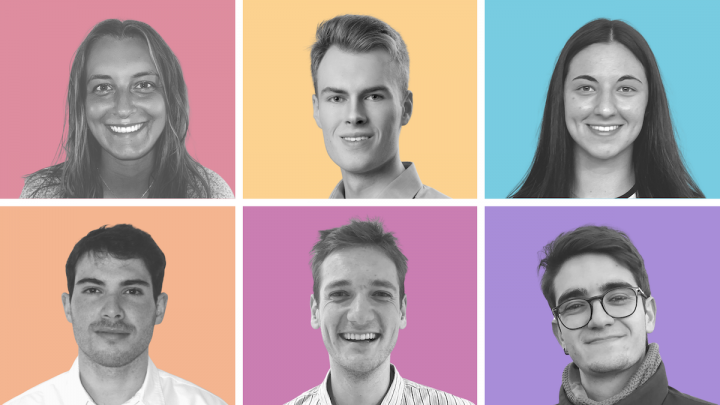
Recipients of 2023 Young Talents Fellowship
We’re excited to announce the six recipients of our 2023 Young Talents Fellowship, who will conduct their Master theses within our member groups in fall 2023 and spring 2024. Congratulations and welcome to our network, Daphne, Christian, Iris, Gabriel, Till and Pol!
Daphne Lucidarme from Belgium studies chemistry at the University of Antwerp and will join the group of Prof. Jérôme Waser at EPFL.
Christian Zachau from Germany studies Chemistry at Freie Universität Berlin, and will join the group of Prof. Bill Morandi at ETH Zurich
Iris Nogueroles Langa from Spain studies Chemical and Bioengineering at ETH Zurich, and will join Prof. Javier Pérez-Ramírez's group at ETH Zurich
Gabriel Chaves Cathoud Pinheiro from Brazil studies Informatics and Engineering at the University of Coimbra in Portugal and will join Prof. Kjell Jorner's group at ETH Zurich.
Till Schreyer from Germany studies Chemistry at the University of Heidelberg, and will join Prof. Cristina Nevado's group at University of Zurich
Pol Gorrea Acin from Spain studies Chemistry at EPFL, and will join Prof. Xile Hu’s group at EPFL
The Young Talents Fellowship supports students with an exceptional academic record and diverse backgrounds. It provides them with the opportunity to conduct a master thesis project in a research group associated with NCCR Catalysis, and to establish their connections and ideas in a multidisciplinary, cross-fertilizing environment of research excellence. This initiative to promote fair representation in catalysis research was launched in 2022. Further editions will be announced on the link below and our social media channels.
Daphne Lucidarme from Belgium studies chemistry at the University of Antwerp and will join the group of Prof. Jérôme Waser at EPFL.
Christian Zachau from Germany studies Chemistry at Freie Universität Berlin, and will join the group of Prof. Bill Morandi at ETH Zurich
Iris Nogueroles Langa from Spain studies Chemical and Bioengineering at ETH Zurich, and will join Prof. Javier Pérez-Ramírez's group at ETH Zurich
Gabriel Chaves Cathoud Pinheiro from Brazil studies Informatics and Engineering at the University of Coimbra in Portugal and will join Prof. Kjell Jorner's group at ETH Zurich.
Till Schreyer from Germany studies Chemistry at the University of Heidelberg, and will join Prof. Cristina Nevado's group at University of Zurich
Pol Gorrea Acin from Spain studies Chemistry at EPFL, and will join Prof. Xile Hu’s group at EPFL
The Young Talents Fellowship supports students with an exceptional academic record and diverse backgrounds. It provides them with the opportunity to conduct a master thesis project in a research group associated with NCCR Catalysis, and to establish their connections and ideas in a multidisciplinary, cross-fertilizing environment of research excellence. This initiative to promote fair representation in catalysis research was launched in 2022. Further editions will be announced on the link below and our social media channels.
22.8.2023

Recipients of 2023 Turbo Grants
We are thrilled to announce the recipients of our first edition of the NCCR Catalysis Turbo Grants! This entrepreneurship program supports early-stage spin-offs in the area of sustainable chemistry and catalysis. All spin-offs are rooted in NCCR Catalysis labs, and this grant enables the researchers to dedicate their time to transitioning their research into a start-up.
We were impressed by the quality of the applications, and are glad to announce the three teams who received a 2023 Turbo Grant:
Jan Weinreich from the group of Clémence Corminboeuf at EPFL is working in the area of digital chemistry.
Benedikt Winter and Johannes Schilling from the Group of André Bardow at ETH are working in the area of digital chemistry. Since being selected, they have onboarded a third co-founder, Carl Hemprich.
Tobias Vornholt from the Thomas Ward group at UniBasel is working in the area of biocatalysis.
Congratulations to the recipients, and we're thrilled to support you as you work on your spin-offs!
We were impressed by the quality of the applications, and are glad to announce the three teams who received a 2023 Turbo Grant:
Jan Weinreich from the group of Clémence Corminboeuf at EPFL is working in the area of digital chemistry.
Benedikt Winter and Johannes Schilling from the Group of André Bardow at ETH are working in the area of digital chemistry. Since being selected, they have onboarded a third co-founder, Carl Hemprich.
Tobias Vornholt from the Thomas Ward group at UniBasel is working in the area of biocatalysis.
Congratulations to the recipients, and we're thrilled to support you as you work on your spin-offs!
8.6.2023

SCNAT Platform Chemistry Ethics Series 2023 ETH Zurich workshop
The 2023 SCNAT Platform Chemistry Ethics Series at ETH Zurich is organized by SCNAT, ETH Zurich, and its Department of Chemistry and Applied Biosciences, D-CHAB. With the union of the doctorate students, postdocs, and scientific staff of D-CHAB, VAC, and the Society for Women in Natural Sciences, WiNS, NCCR Catalysis supports this year’s workshop on Recognizing and Overcoming Bias.
The opening talks are given by Prof. Lee Penn, University of Minnesota (“Images as Representations of Reality”) and Kaila Yallum, UniBe (“Implicit Bias in Experimental Research”). Prof. Lee Penn will then address “How to Overcome Implicit Bias Everyday”, followed by interactive discussions.
The opening talks are given by Prof. Lee Penn, University of Minnesota (“Images as Representations of Reality”) and Kaila Yallum, UniBe (“Implicit Bias in Experimental Research”). Prof. Lee Penn will then address “How to Overcome Implicit Bias Everyday”, followed by interactive discussions.
30.5.2023

Science communication seminar with Dr. Fernando Gomollón-Bel
We have the pleasure of welcoming Dr. Fernando Gomollón-Bel for a science communication seminar on Beyond publishing papers: learn some Sci Comm tips and tricks. Fer is a well-known science communicator in the field of chemistry and materials, and co-founder of Agatha Communications, a small science communication agency based in the UK.
The seminar is open to all, and you can still sign up here.
The seminar is open to all, and you can still sign up here.
27.3.2023
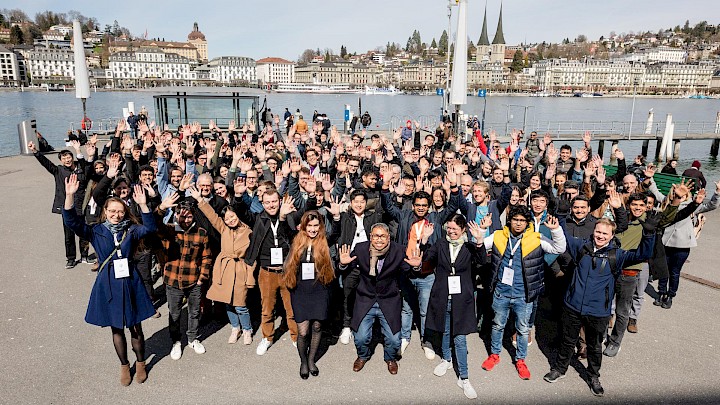
NCCR Catalysis Annual Retreat 2023
On March 27-29 2023, NCCR Catalysis held its Annual Retreat in Lucerne, Switzerland. We welcomed 150 members of our network and spent three exciting days filled with sustainable chemistry research presented by our talents, brainstorming on program activities and exchanges. It was wonderful to have our second network-wide meeting, and to connect in person!
We heard excellent presentations by the 2022 Young Talents Fellowship recipients, and talks and posters by PhD students and researchers across all five WPs. We're excited to announce the following awards:
Best Talks: Andrea Ruiz, Lopez group, ICIQ and Kevin Rossi, Pérez-Ramírez group, ETH Zurich; Ludovic Zaza, Buonsanti group, EPFL and Bojana Ranković, Schwaller group, EPFL
Best Poster: Maxime Hedou, Marti group, HES-SO
Best Poster Runner-Ups: Nieves Ramirez, Waser group, EPFL; Sebastiano D’Angelo, Guillén-Gosálbez group, ETH Zurich; and Stephan Pollitt, Nachtegaal/Safonova group, PSI
Congratulations to all awardees and many thanks to all participants for making this a fantastic community-wide event!
We heard excellent presentations by the 2022 Young Talents Fellowship recipients, and talks and posters by PhD students and researchers across all five WPs. We're excited to announce the following awards:
Best Talks: Andrea Ruiz, Lopez group, ICIQ and Kevin Rossi, Pérez-Ramírez group, ETH Zurich; Ludovic Zaza, Buonsanti group, EPFL and Bojana Ranković, Schwaller group, EPFL
Best Poster: Maxime Hedou, Marti group, HES-SO
Best Poster Runner-Ups: Nieves Ramirez, Waser group, EPFL; Sebastiano D’Angelo, Guillén-Gosálbez group, ETH Zurich; and Stephan Pollitt, Nachtegaal/Safonova group, PSI
Congratulations to all awardees and many thanks to all participants for making this a fantastic community-wide event!
1.3.2023
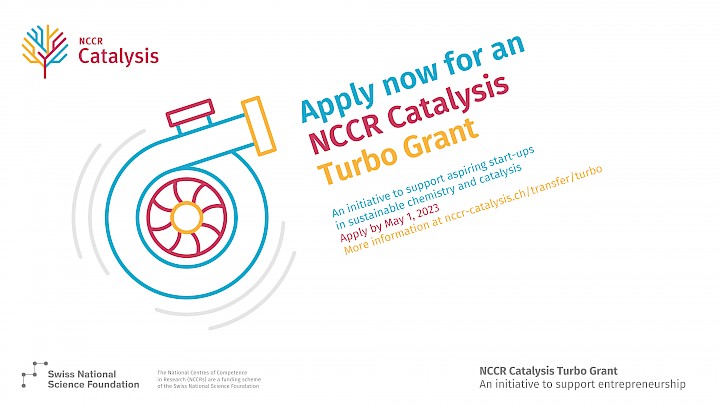
Launch of Turbo Grant
In March 2023, we launched our spin-off support program, the NCCR Catalysis Turbo Grant. With this initiative, we support research projects as they transition into a start-up company, and provide budding entrepreneurs with one year’s salary as they further develop their prototype, business plan, and assess the market. During the grant period, they are hosted in one of our NCCR Catalysis member labs, integrated as members of our network, and supported by our Project Office.
27.2.2023
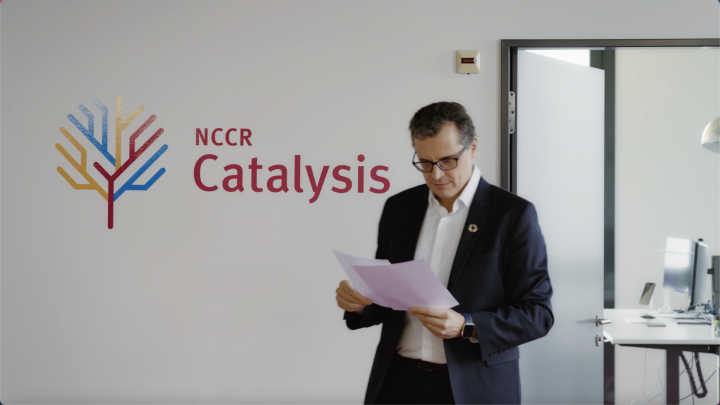
Release of statement by Director Prof. Javier Pérez-Ramírez
We are excited to release a statement by NCCR Catalysis Director Prof. Javier Pérez-Ramírez from the Department of Chemistry and Applied Biosciences at ETH Zurich. He explains why we need to switch to sustainable chemicals production urgently, addresses our program's role in this endeavor, and how we integrate sustainability into our approach. Learn more in the video!
1.2.2023

Arnold (Abel) Gimeno joins as Administrative Assistant
Arnold (Abel) Gimeno joined our Project Office team in February as Administrative Assistant. He has extensive international experience in dealing with administrative matters. Welcome to the team, Abel!
9.1.2023

Kjell Jorner starts as Assistant Professor of Digital Chemistry
Prof. Kjell Jorner was appointed in May 2022 as Assistant Professor of Digital Chemistry at ETH Zurich’s Department of Chemistry and Applied Biosciences. He fills one of the three Assistant Professorship positions at ETH Zurich and EPFL embedded in NCCR Catalysis. We’re pleased to finally welcome you to our network and we wish you a great start, Kjell!
1.1.2023
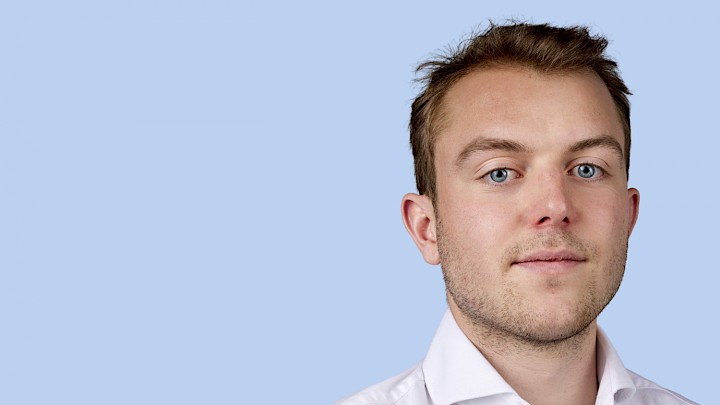
Romain Graux joins as Data Officer
Romain Graux joined our Project Office team in January as Data Officer. He recently completed his master's degree in Data Science, and his expertise in this field will be instrumental in advancing our organization's data-driven initiatives. Welcome to the team, Romain!
14.11.2022
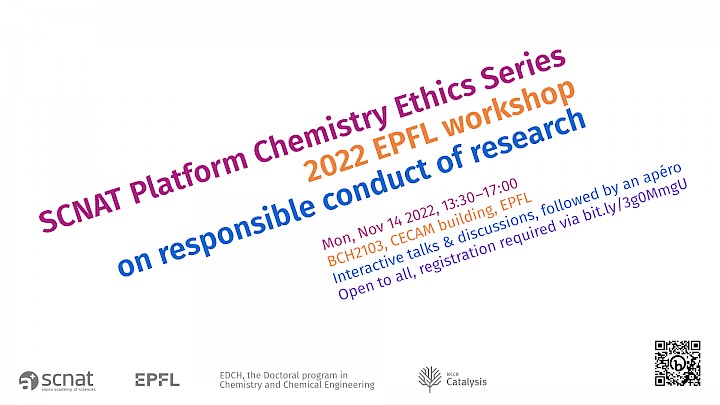
SCNAT Platform Chemistry Ethics Series 2022 EPFL workshop
The 2022 re-launch of the SCNAT Platform Chemistry Ethics Series at EPFL was organized by SCNAT, EPFL, EDCH (its doctoral program in chemistry and chemical engineering), and NCCR Catalysis.
The event started with talks by Prof. Edward Constable (president of the Swiss Academies' Committee for Research Integrity, Prof. University of Basel) and Prof. Antonio Togni (former Vice Rector for Doctoral Studies, Prof. em. ETH Zurich) on "Surely it doesn’t apply to me? Equating integrity with best practice"and "Orchestrating relevance: A questionable trait of modern publication culture", respectively, moderated by Prof. Jérôme Waser from EPFL, substituting for Prof. Shana Sturla from ETH Zurich. The speakers and panelists then led interactive discussion rounds, on which participants reported to the plenary. The afternoon concluded with an apéro.
The organizers included Prof. Shana Sturla and Dr. Leo Merz, SCNAT; Prof. Berend Smit and Anne Lene Odegaard, EPFL and EDCH; and Dr. Marie Francine Lagadec, NCCR Catalysis.
The event started with talks by Prof. Edward Constable (president of the Swiss Academies' Committee for Research Integrity, Prof. University of Basel) and Prof. Antonio Togni (former Vice Rector for Doctoral Studies, Prof. em. ETH Zurich) on "Surely it doesn’t apply to me? Equating integrity with best practice"and "Orchestrating relevance: A questionable trait of modern publication culture", respectively, moderated by Prof. Jérôme Waser from EPFL, substituting for Prof. Shana Sturla from ETH Zurich. The speakers and panelists then led interactive discussion rounds, on which participants reported to the plenary. The afternoon concluded with an apéro.
The organizers included Prof. Shana Sturla and Dr. Leo Merz, SCNAT; Prof. Berend Smit and Anne Lene Odegaard, EPFL and EDCH; and Dr. Marie Francine Lagadec, NCCR Catalysis.
18.10.2022
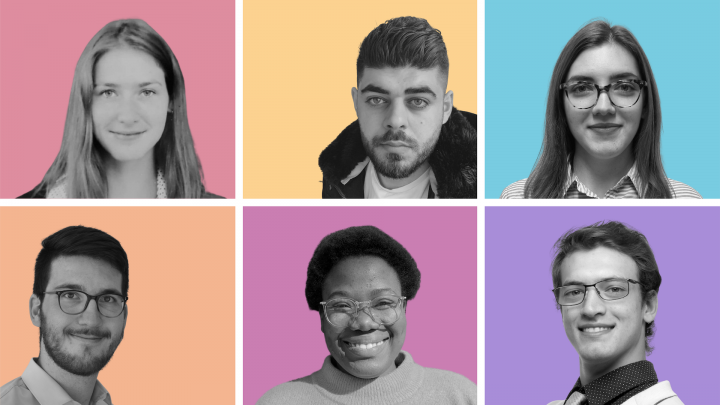
Recipients of 2022 Young Talents Fellowship
We’re excited to announce the six recipients of our 2022 Young Talents Fellowship, who will conduct their Master theses within our member groups in fall 2022/spring 2023. Congratulations and welcome to our network, Morgane, Layth, Gabriela, Nicolas, Gloria and Adrián!
Morgane Delattre from France studies Organic Chemistry at CPE Lyon, and is an exchange student at EPFL, where she joined the group of Prof. Jieping Zhu.
Layth Alama from Palestine studies Chemistry at the Free University of Berlin, and will join Prof. Nicolai Cramer’s group at EPFL.
Gabriela Dutcă from Romania studies Chemical Engineering at the University of Groningen, and joined Prof. Javier Pérez-Ramírez’s group at ETH Zurich.
Nicolas Imstepf from Switzerland studies Life Sciences at the Zurich University of Applied Sciences, ZHAW, and joined the group of Prof. Rebecca Buller at ZHAW.
Gloria Candy Danielle Sedoh from Togo studies Chemistry at the University of Geneva, and joined the groups of Prof. Ross Milton at University of Geneva and Prof. Kevin Sivula at EPFL.
Adrián Sager La Ganga from Spain studies Computational Science & Engineering at EPFL, and joined Dr. Teodoro Laino’s group at IBM Research.
The Young Talents Fellowship supports students with an exceptional academic record and diverse backgrounds. It provides them with the opportunity to conduct a master thesis project in a research group associated with NCCR Catalysis, and to establish their connections and ideas in a multidisciplinary, cross-fertilizing environment of research excellence. This initiative to promote fair representation in catalysis research was launched in 2022. Further editions will be announced on the link below and our social media channels.
Morgane Delattre from France studies Organic Chemistry at CPE Lyon, and is an exchange student at EPFL, where she joined the group of Prof. Jieping Zhu.
Layth Alama from Palestine studies Chemistry at the Free University of Berlin, and will join Prof. Nicolai Cramer’s group at EPFL.
Gabriela Dutcă from Romania studies Chemical Engineering at the University of Groningen, and joined Prof. Javier Pérez-Ramírez’s group at ETH Zurich.
Nicolas Imstepf from Switzerland studies Life Sciences at the Zurich University of Applied Sciences, ZHAW, and joined the group of Prof. Rebecca Buller at ZHAW.
Gloria Candy Danielle Sedoh from Togo studies Chemistry at the University of Geneva, and joined the groups of Prof. Ross Milton at University of Geneva and Prof. Kevin Sivula at EPFL.
Adrián Sager La Ganga from Spain studies Computational Science & Engineering at EPFL, and joined Dr. Teodoro Laino’s group at IBM Research.
The Young Talents Fellowship supports students with an exceptional academic record and diverse backgrounds. It provides them with the opportunity to conduct a master thesis project in a research group associated with NCCR Catalysis, and to establish their connections and ideas in a multidisciplinary, cross-fertilizing environment of research excellence. This initiative to promote fair representation in catalysis research was launched in 2022. Further editions will be announced on the link below and our social media channels.
21.6.2022
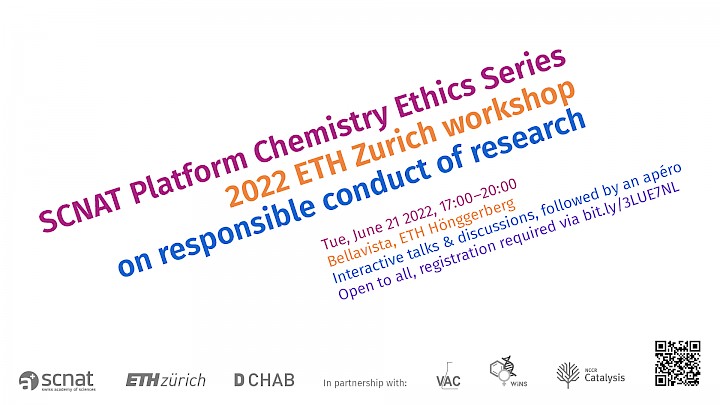
SCNAT Platform Chemistry Ethics Series 2022 ETH Zurich workshop
The 2022 re-launch of the SCNAT Platform Chemistry Ethics Series at ETH Zurich was organized by SCNAT, ETH Zurich and its Department of Chemistry and Applied Biosciences, D-CHAB. Together with the union of the doctorate students, postdocs and scientific staff of D-CHAB, VAC and of the Society for Women in Natural Sciences, WiNS, NCCR Catalysis supported this year’s workshop on responsible conduct of research.
The event started with talks by Prof. Edward Constable (president of the Swiss Academies' Committee for Research Integrity, Prof. University of Basel) and Prof. Antonio Togni (former Vice Rector for Doctoral Studies, Prof. em. ETHZ) on "Surely it doesn’t apply to me? Equating integrity with best practice" and "Orchestrating relevance: A questionable trait of modern publication culture", respectively, moderated by Prof. Shana Sturla. The speakers and panelists from VAC, WiNS and NCCR Catalysis then led interactive discussion rounds, on which participants reported to the plenary. The evening concluded with an apéro.
The organizers included Prof. Shana Sturla and Dr. Leo Merz, SCNAT; Prof. Christophe Copéret, D-CHAB; Moritz Bernhardt, VAC; Dr. Monika Colombo, WiNS; and Dr. Marie Francine Lagadec, NCCR Catalysis.
The event started with talks by Prof. Edward Constable (president of the Swiss Academies' Committee for Research Integrity, Prof. University of Basel) and Prof. Antonio Togni (former Vice Rector for Doctoral Studies, Prof. em. ETHZ) on "Surely it doesn’t apply to me? Equating integrity with best practice" and "Orchestrating relevance: A questionable trait of modern publication culture", respectively, moderated by Prof. Shana Sturla. The speakers and panelists from VAC, WiNS and NCCR Catalysis then led interactive discussion rounds, on which participants reported to the plenary. The evening concluded with an apéro.
The organizers included Prof. Shana Sturla and Dr. Leo Merz, SCNAT; Prof. Christophe Copéret, D-CHAB; Moritz Bernhardt, VAC; Dr. Monika Colombo, WiNS; and Dr. Marie Francine Lagadec, NCCR Catalysis.
10.6.2022
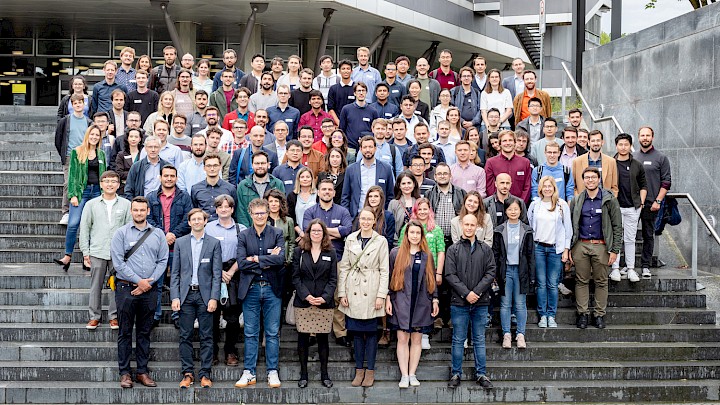
NCCR Catalysis Annual Event 2022
On June 9-10 2022, NCCR Catalysis held its first Annual Event at ETH Zurich, Campus Hönggerberg. We welcomed 145 members of our network and spent two exciting days filled with catalysis and sustainable chemistry research presented by our talents. It was a wonderful to have our first physical meeting after 22 months of operation, and to connect in person!
We saw excellent presentations and posters by PhD students and researchers across all five WPs and are excited to announce the following awards:
Best Talk: Anastasiia Komarova, Luterbacher group, EPFL
Runner Up Talks: Thomas Moragues, deMello group, ETH Zurich and Mojmir Mutny, Krause group, ETH Zurich
Best Poster: Alessandra Toniato, Laino group, IBM Research Zurich
Runner Up Posters: Ludovic Zaza, Buonsanti group, EPFL and Lukas Spiekermann, Bardow group, ETH Zurich
Congratulations to all awardees and many thanks to all participants for making this a fantastic community-wide event!
We saw excellent presentations and posters by PhD students and researchers across all five WPs and are excited to announce the following awards:
Best Talk: Anastasiia Komarova, Luterbacher group, EPFL
Runner Up Talks: Thomas Moragues, deMello group, ETH Zurich and Mojmir Mutny, Krause group, ETH Zurich
Best Poster: Alessandra Toniato, Laino group, IBM Research Zurich
Runner Up Posters: Ludovic Zaza, Buonsanti group, EPFL and Lukas Spiekermann, Bardow group, ETH Zurich
Congratulations to all awardees and many thanks to all participants for making this a fantastic community-wide event!
8.6.2022
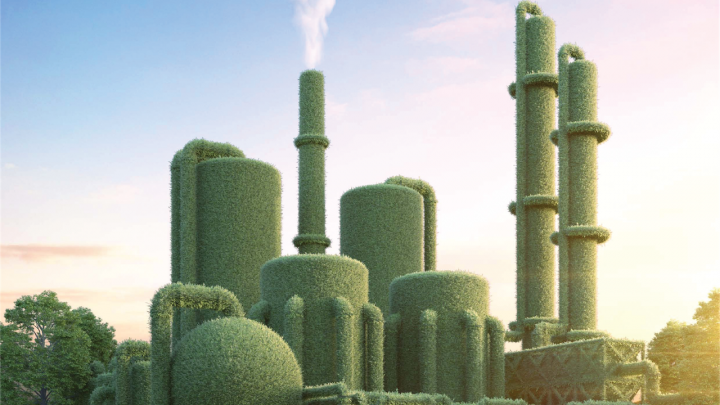
Release of video on sustainability of chemicals through the lens of planetary boundaries
We had a great time shooting a video with the teams of Prof. Javier Pérez-Ramírez and Prof. Gonzalo Guillén-Gosálbez from ETH Zurich on their NCCR Catalysis study on sustainability assessments of chemicals production, and are excited to see it released!
The teams investigated whether the production of the 492 most relevant chemicals is sustainable with respect to transgression of planetary boundaries. In this NCCR Catalysis study, they found that 99.4% of these chemicals exceed at least one such boundary, which makes them unsustainable in the long term. Learn more about their findings in the video and the publication!
The teams investigated whether the production of the 492 most relevant chemicals is sustainable with respect to transgression of planetary boundaries. In this NCCR Catalysis study, they found that 99.4% of these chemicals exceed at least one such boundary, which makes them unsustainable in the long term. Learn more about their findings in the video and the publication!
4.4.2022

Launch of short explainer animation
We're excited to launch a short animation to introduce NCCR Catalysis to the broad public and to make our research accessible beyond the catalysis community.
Learn more about our program in English, German and French!
Learn more about our program in English, German and French!
17.3.2022
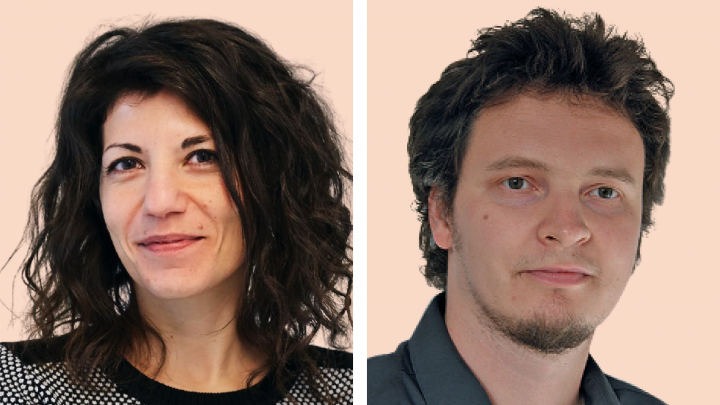
Promotions for Prof. Raffaella Buonsanti and Prof. Bill Morandi
Prof. Raffaella Buonsanti, Core PI at EPFL and Work Package 3 Coordinator at NCCR Catalysis, was recently promoted to Associate Professor, and received an ERC Consolidator Grant. She works on the development of novel synthetic routes to tailor-make multifunctional hybrid materials, based on atomically defined colloidal nanocrystals, and on control of structure and composition at multiple length-scales, driven by a fundamental understanding of the chemical transformations driving nucleation, growth and assembly.
Prof. Bill Morandi, Associate PI at ETH Zurich, was promoted to Full Professor and is Head of the Laboratory of Organic Chemistry. He works on the development of innovative synthetic methodologies for applications across the molecular sciences, with a particular interest in establishing new concepts in catalysis.
Congratulations on these big career steps, Raffaella and Bill!
Prof. Bill Morandi, Associate PI at ETH Zurich, was promoted to Full Professor and is Head of the Laboratory of Organic Chemistry. He works on the development of innovative synthetic methodologies for applications across the molecular sciences, with a particular interest in establishing new concepts in catalysis.
Congratulations on these big career steps, Raffaella and Bill!
17.2.2022
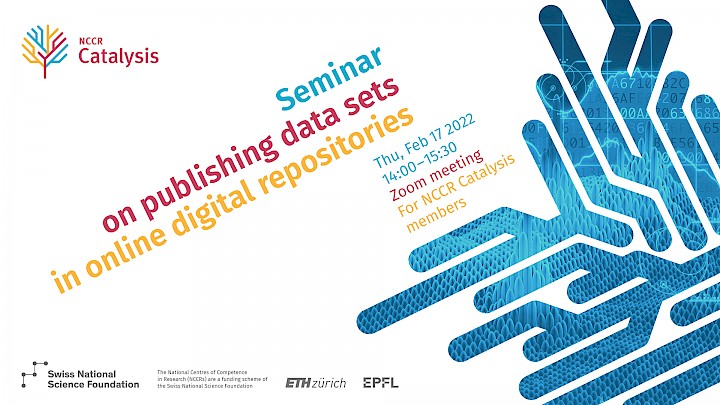
Seminar on publishing data sets in online digital repositories
In this seminar, the NCCR Catalysis Project Office will present the program's strategy for fulfilling SNSF's requirements on data sets and publications. Prof. Nicola Marzari, NCCR Catalysis Associate PI from EPFL, will give an outlook on data accessibility and re-usability, which will be followed by demonstrations on how to upload data sets to the Zenodo and Materials Cloud Archive repositories, and a Q&A session.
This event on February 17 2022 is for NCCR Catalysis members.
This event on February 17 2022 is for NCCR Catalysis members.
15.2.2022

Ajdin Zekjiri joins as Administrative Assistant
Ajdin Zekjiri joined our Project Office as Administrative Assistant in February, and is our team's contact point for administrative matters. He is a part-time student in Linguistic Integration at ZHAW. Welcome to the team, Ajdin!
1.12.2021
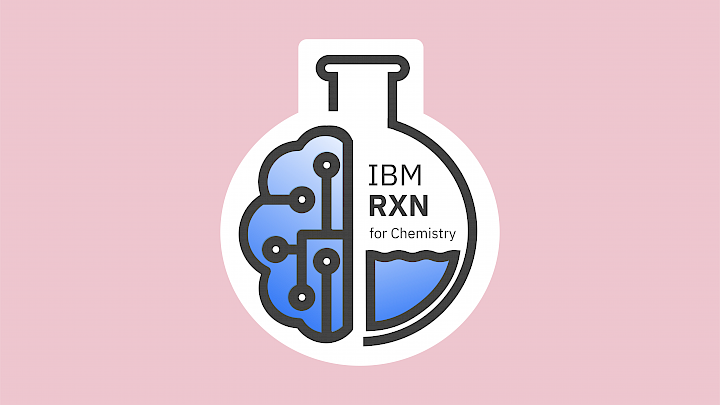
Sandmeyer 2022 Award for the IBM RXN for Chemistry team
The Sandmeyer Award by the Swiss Chemical Society is presented to a team or an individual for outstanding work in the field of industrial or applied chemistry. The IBM RXN for Chemistry Project Team - including NCCR Catalysis members Dr. Alain Vaucher, Dr. Daniel Probst, Dr. Philippe Schwaller, Theophile Gaudin, Alessandra Toniato and Core PI Dr. Teodoro Laino - was awarded the Sandmeyer Award 2022, which recognizes their contributions towards the digitalization of synthetic organic chemistry. Congratulations to all team members!
1.12.2021

Swiss Green & Sustainable Chemistry Award 2022 for Prof. Xile Hu
The Swiss Green & Sustainable Chemistry Award was implemented by the Swiss Chemical Society in collaboration with Syngenta as founding partner and SusChem Switzerland as hosting institution. The award recognizes young academic investigators to contribute to the development of sustainable chemical methodologies and technologies, and targets professors, who have made outstanding scientific discoveries within the field of Green & Sustainable Chemistry. Prof. Xile Hu, Core PI at EPFL, received the Swiss Green & Sustainable Chemistry Award 2022 for his interdisciplinary research to develop catalysis for sustainable synthesis of added-value chemicals and for cost-effective production of solar and electric fuels. Congratulations, Xile!
18.11.2021
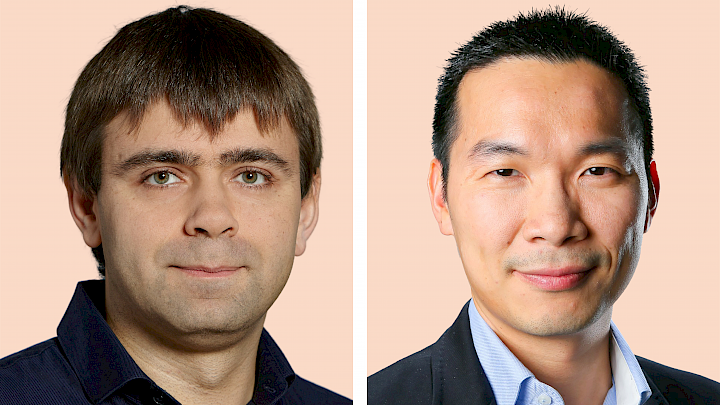
NCCR Catalysis PIs among Clarivate’s 2021 list of Highly Cited Researchers
Prof. Maksym Kovalenko, Core PI at ETH Zurich, and Prof. Xile Hu, Core PI at EPFL, ranked among the top 1% of cited researcher in Clarivate’s 2021 list of Highly Cited Researchers. Congratulations, Maksym and Xile!
15.11.2021
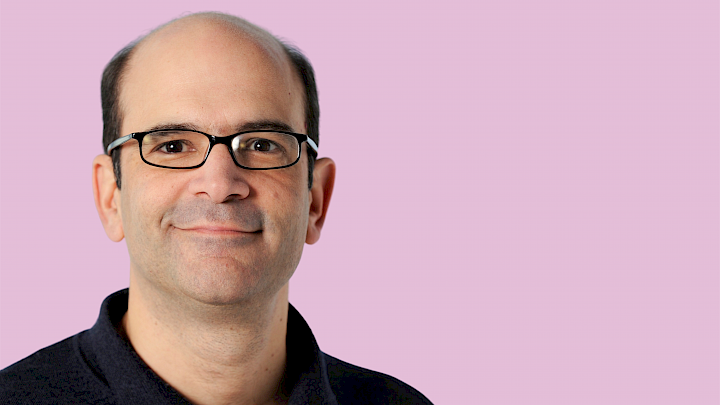
Ryoji Noyori Prize for Prof. Erick M. Carreira
The Ryoji Noyori Prize by Takasago International Corporation and administered by the Society of Synthetic Organic Chemistry, Japan recognizes outstanding contributions to research in asymmetric synthetic chemistry defined in its broadest sense. Prof. Erick M. Carreira, Core PI at ETH Zurich, was awarded the Ryoji Noyori Prize 2021 in recognition of his contributions in various areas, including natural products synthesis, methodology, asymmetric catalysis, medicinal chemistry, and chemical biology. Congratulations, Erick!
28.9.2021

Rössler Prize and Max Planck Fellowship for Prof. Andreas Krause
The Rössler Prize by ETH Zurich is awarded to promising young scientists in the middle of an accelerating career. Prof. Andreas Krause, Core PI at ETH Zurich, was awarded both ETH Zurich’s Rössler Prize recognising him as a rising star in his field of research, and a Max Planck Fellowship for his research in the field of machine learning. As a Max Planck fellow, he will supervise a research group focussing on interactive learning. Congratulations, Andreas!
5.9.2021

Summer School on Catalysis and Sustainable Chemistry
The Swiss Summer School 2021: Catalysis and Sustainable Chemistry is co-organized by the Swiss Chemical Society and NCCR Catalysis, and will take place from September 5-9 2021 in Les Diablerets, Switzerland. The Swiss Summer School 2021 offers an interactive program with input lectures by experts from academia and industry, poster sessions, student presentations, and guest-lectures on topics of general interest. Interested? You can find more information and register here.
27.8.2021
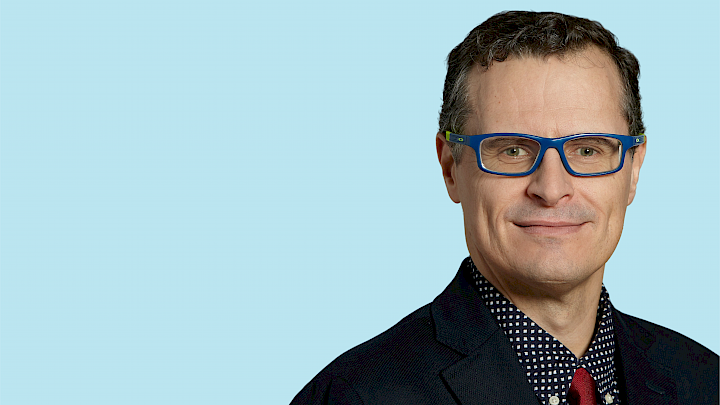
Robert K. Grasselli Award for Prof. Javier Pérez-Ramírez
The 2021 EFCATS Robert K. Grasselli Award for Catalysis honours outstanding theoretical and experimental contributions in the field of oxidation catalysis of the past five years that have advanced our understanding and practice of catalysis. Prof. Javier Pérez-Ramírez, Director of NCCR Catalysis, is the first recipient of this prestigious award. It recognises his discoveries that generated almost unlimited opportunities for innovation in the direct functionalization of natural gas involving halides, and led to better ways to make many key building blocks for the manufacture of chemicals, polymers, and fuels. Congratulations, Javier!
The award ceremony takes place on September 2, 2 PM CEST via the following link: https://s.ntnu.no/EFCATSawards.
The award ceremony takes place on September 2, 2 PM CEST via the following link: https://s.ntnu.no/EFCATSawards.
16.7.2021
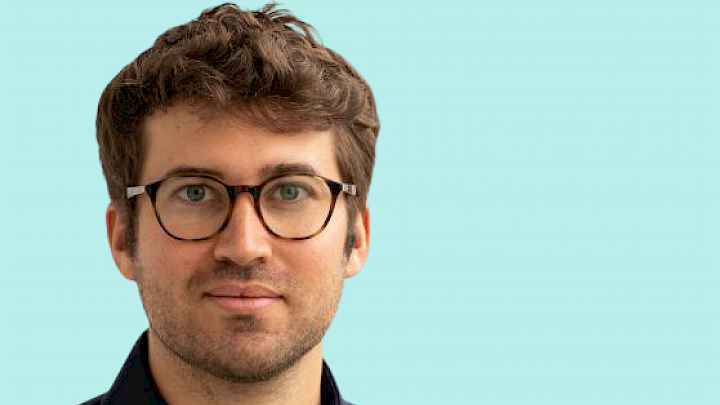
Dr. Philippe Schwaller appointed as Tenure-Track Assistant Professor
Postdoctoral researcher Dr. Philippe Schwaller was appointed as Tenure-Track Assistant Professor at EPFL’s Institute of Chemical Sciences and Engineering, filling one of the three Assistant Professorship positions at ETH Zurich and EPFL that are embedded in NCCR Catalysis. His appointment strengthens our network’s expertise in digital chemistry. Congratulations and welcome as a PI, Philippe!
17.6.2021

European Inventor Award for Prof. Robert Grass and Prof. Wendelin Stark
With the European Inventor Award, the European Patent Office honours individual inventors and teams of inventors whose pioneering inventions provide answers to some of the biggest challenges of our times. Prof. Robert Grass, adjunct professor at ETH Zurich, and Prof. Wendelin J. Stark, Core PI at ETH Zurich, won the European Inventor Award 2021 for their work on stable data storage in glass-encapsulated DNA. When these beads are applied to products, they ensure that specific indicators - for example origin or working conditions - are traceable throughout the supply chain. Congratulations, Robert and Wendelin!
15.6.2021
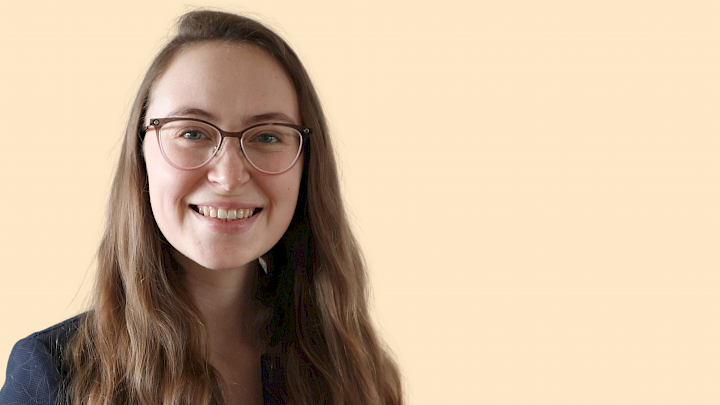
Lauren Gamp joins as Knowledge and Technology Transfer Officer
Lauren Gamp joined our Management Team as Knowledge and Technology Transfer (KTT) Officer in June, and is our program's point of contact for KTT and industry matters. For her master thesis on academia-industry relationships conducted at Hochschule Luzern, Lauren recently won the Swiss Wirtschaftsingenieure award. Welcome to the team and congratulations, Lauren!
14.6.2021
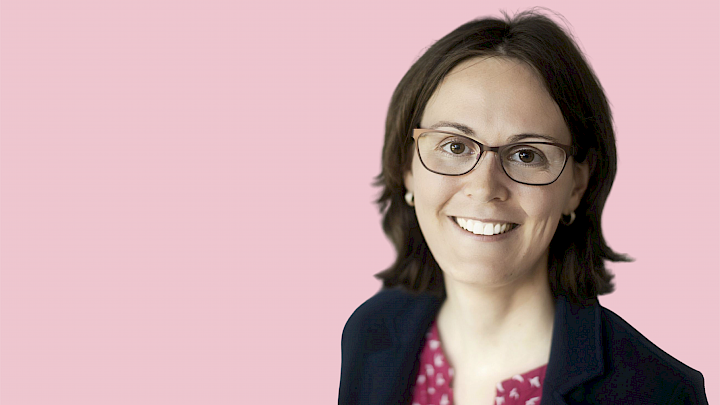
Coblentz Award for Prof. Sandra Luber
The Coblentz Award by the Coblentz Society is presented annually to an outstanding young molecular spectroscopist under the age of 40. Prof. Sandra Luber, Associate PI at UZH where she was promoted to Associate Professor earlier this year, received the Coblentz Award 2021 for her work on molecular spectroscopy. Congratulations, Sandra!
7.6.2021
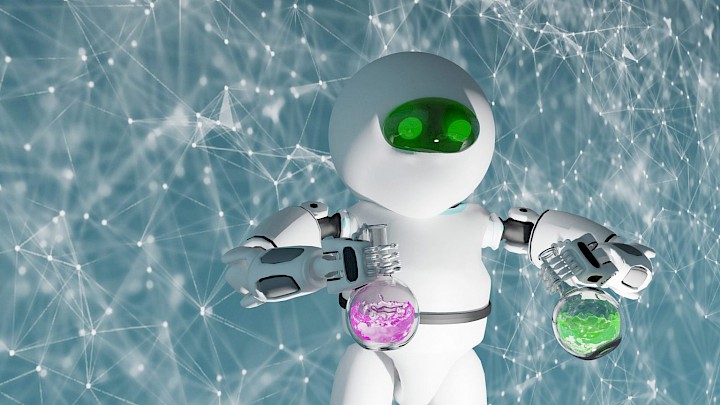
Summer school on big data and machine learning for chemistry
The Summer School on Big Data and Machine Learning for Chemistry is co-organized by EPFL and ETHZ and co-sponsored by NCCR Catalysis, and will take place from June 7-9 2021 as a hybrid live/online event. The summer school will provide an overview on machine learning models through presentations and hands-on tutorials, and discussions on specific applications for computational chemistry, catalysis, and high-throughput screening. The speakers will give both theoretical and experimental perspectives, and the program targets chemists and chemical engineers. Interested? You can find more information and register here.
13.4.2021
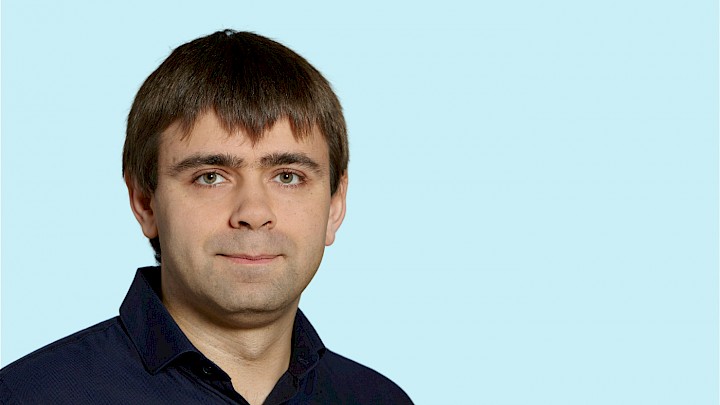
Dan Maydan Prize for Prof. Maksym Kovalenko
The Dan Maydan Prize is awarded yearly to emerging and outstanding young scientists from Israel or abroad for their significant academic accomplishments in the field of nanoscience and nanotechnology. Prof. Maksym Kovalenko, a Core PI of NCCR Catalysis, received the 2021 Dan Maydan Prize for Nanoscience Research for his pioneering work on surface chemistry of nanocrystals and their use for electronic and optoelectronic devices, including batteries, photodetectors, thermo-electrics, solar cells and light sources. Congratulations, Maksym!
25.3.2021
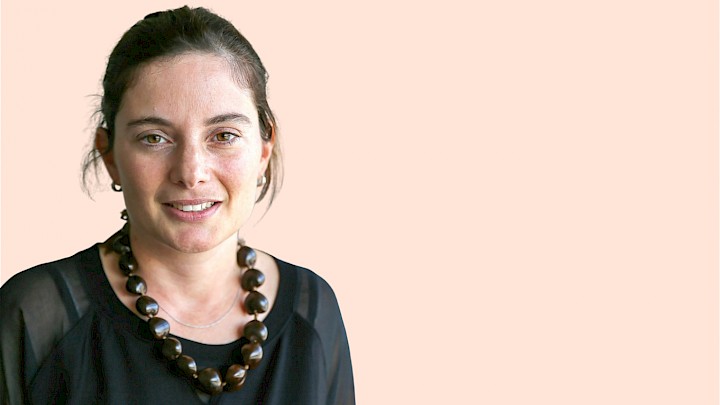
Heilbronner-Hückel Lectureship Award for Prof. Clémence Corminboeuf
The Heilbronner-Hückel Lecture Series is a joint initiative by the Gesellschaft Deutscher Chemiker and the Swiss Chemical Society, and the annual series takes place alternatively in Switzerland and Germany. Prof. Clémence Corminboeuf, Core PI at EPFL, was awarded the Heilbronner-Hückel Lectureship Award 2021 and invited for a lecture tour in Germany. Her work focuses on electronic structure theory in method development, conceptual work applied to homogeneous catalysis and organic electronics and - more recently - models for machine learning. Congratulations, Clémence!
5.3.2021

Prof. Jeremy Luterbacher now Associate Professor
Prof. Jeremy S. Luterbacher, a Core PI of NCCR Catalysis and previously Tenure Track Assistant Professor at EPFL, was promoted to Associate Professor of Chemical Process Engineering in EPFL's School of Basic Sciences. He works on biomass conversion technologies including alternatives to oil for manufacturing plastics and other common chemicals. He has been awarded a number of prizes for his work in the field of chemical engineering, among them an ACS Sustainable Chemistry & Engineering Lectureship Award. Congratulations, Jeremy!
25.2.2021

Dr. Margaret Faul Award 2021 for Prof. Cristina Nevado
The Dr. Margaret Faul Award for Women in Chemistry is awarded to young woman within the first 15 years of their independent career in chemical research in recognition of their outstanding achievements in organic chemistry. Prof. Cristina Nevado, a Core PI of NCCR Catalysis, was awarded the Dr. Margaret Faul Award 2021 for the breadth and diversity of her work - spanning the development of new catalytic methods, important contributions in the synthesis of medicinally relevant natural products, and development of bioactive chemical probes. Congratulations, Cristina!
5.2.2021

Prof. Thomas Ward awarded 2021 ACS Catalysis Lectureship
The ACS Catalysis Lectureship for the Advancement of Catalytic Science is awarded to an individual or team in recognition of their ground-breaking research in catalysis over the past seven years, and is cosponsored by the ACS Division of Catalysis Science and Technology (CATL) and ACS Catalysis. Prof. Thomas R. Ward, a Core PI of NCCR Catalysis, was awarded the 2021 ACS Catalysis Lectureship for his cross-disciplinary research approach on artificial metalloenzymes for organic synthesis - by merging organometallic catalysis with enzymatic catalysis - in living systems, which blurrs boundaries across fields of catalysis. Congratulations, Tom!
17.12.2020
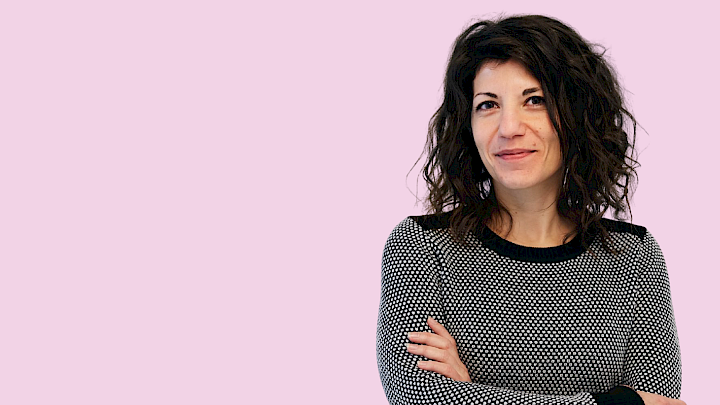
Prof. Raffaella Buonsanti awarded Werner Prize 2021
The Werner Prize by the Swiss Chemical Society is awarded to promising young scientists for outstanding independent chemical research. Prof. Raffaella Buonsanti, a Core PI and work package coordinator of NCCR Catalysis, was awarded the Werner Prize 2021 for her original and significant contributions in the chemistry development of tailored nanomaterials and their applications in catalysis, especially CO₂ electroreduction. Congratulations, Raffaella!
15.10.2020
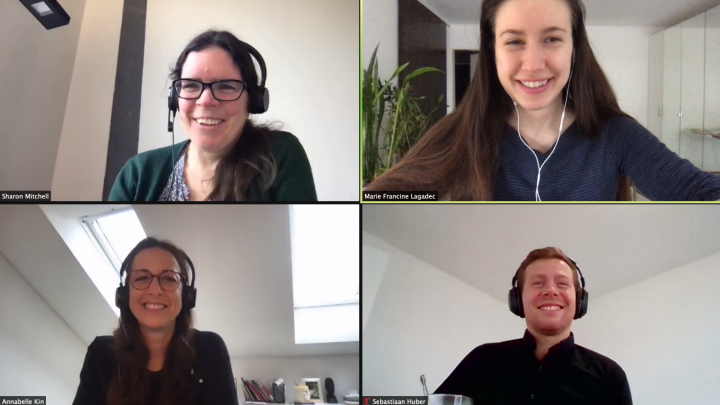
Project Office is operative
The NCCR Catalysis Project Office is now operative. It consists of Dr. Marie Francine Lagadec (Program Coordinator, ETHZ), Dr. Sharon Mitchell (Program Advisor, ETHZ), Annabelle Kin (Administrative and Finance Officer, ETHZ), and Dr. Sebastiaan Huber (Data Officer, EPFL).
1.8.2020
Launch of NCCR Catalysis
We're delighted to announce the launch of the NCCR Catalysis, which is funded by the Swiss National Science Foundation, and hosted by ETHZ and EPFL. In the coming years, we will investigate new approaches to create carbon-neutral chemical value chains based on catalytic processes. At the contributing institutions - ETHZ, EPFL, HES-SO, IBM, UniBas, UniBe, UZH, ZHAW - more than 100 scientists are working towards shaping a digital-driven accelerated shift to develop future catalytic technologies, and to enable a renewable society with carbon-neutral chemical value chains.